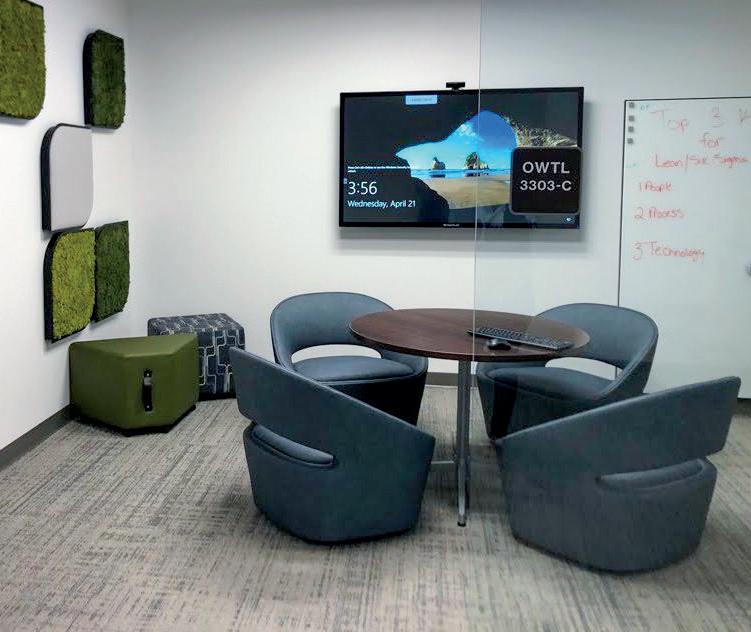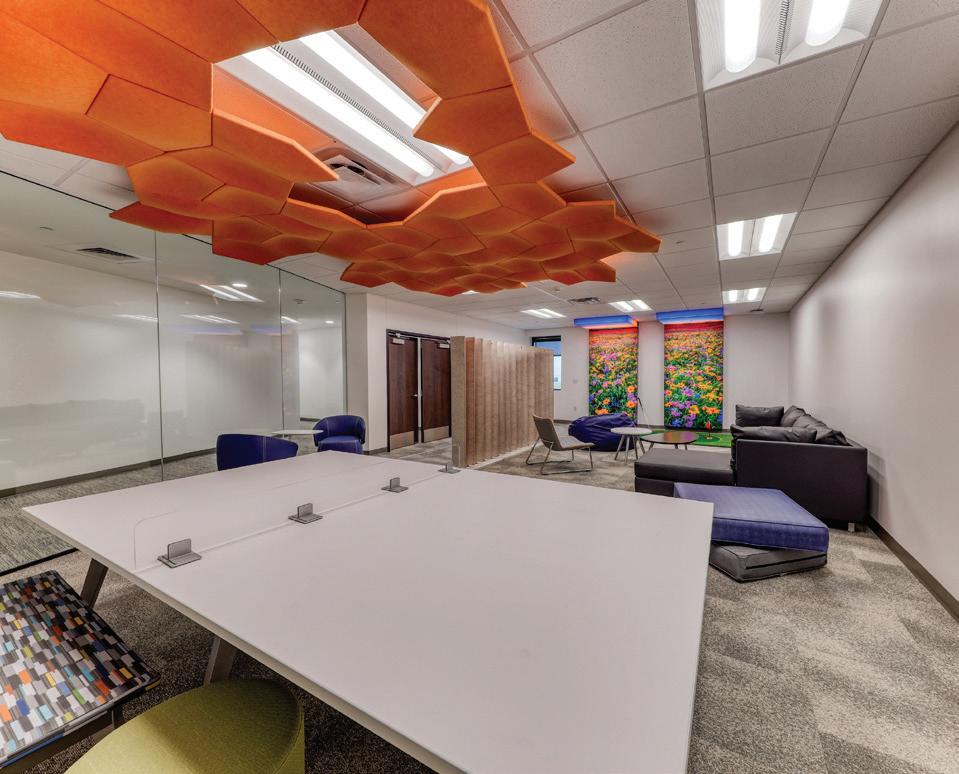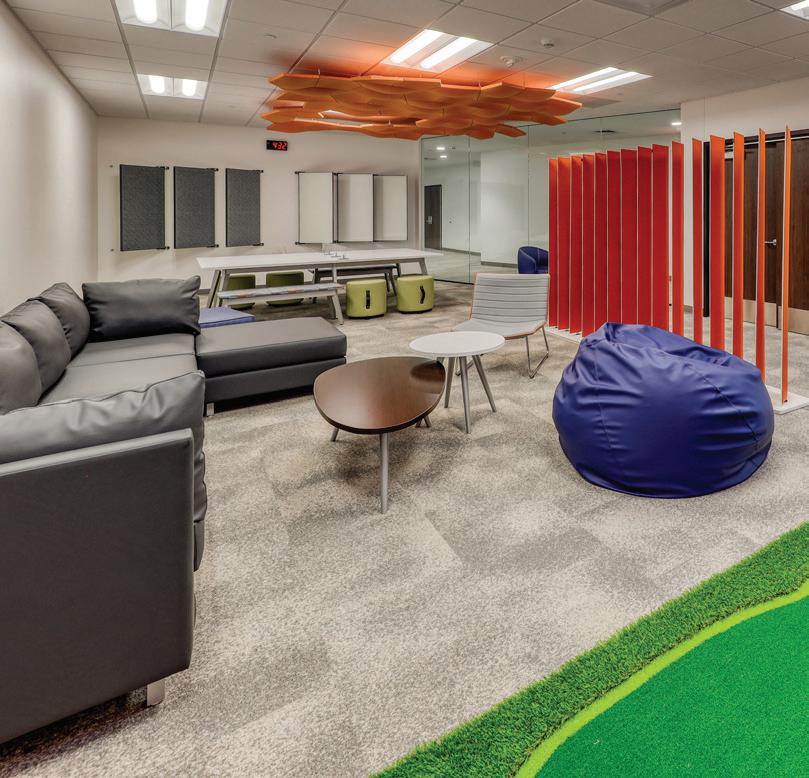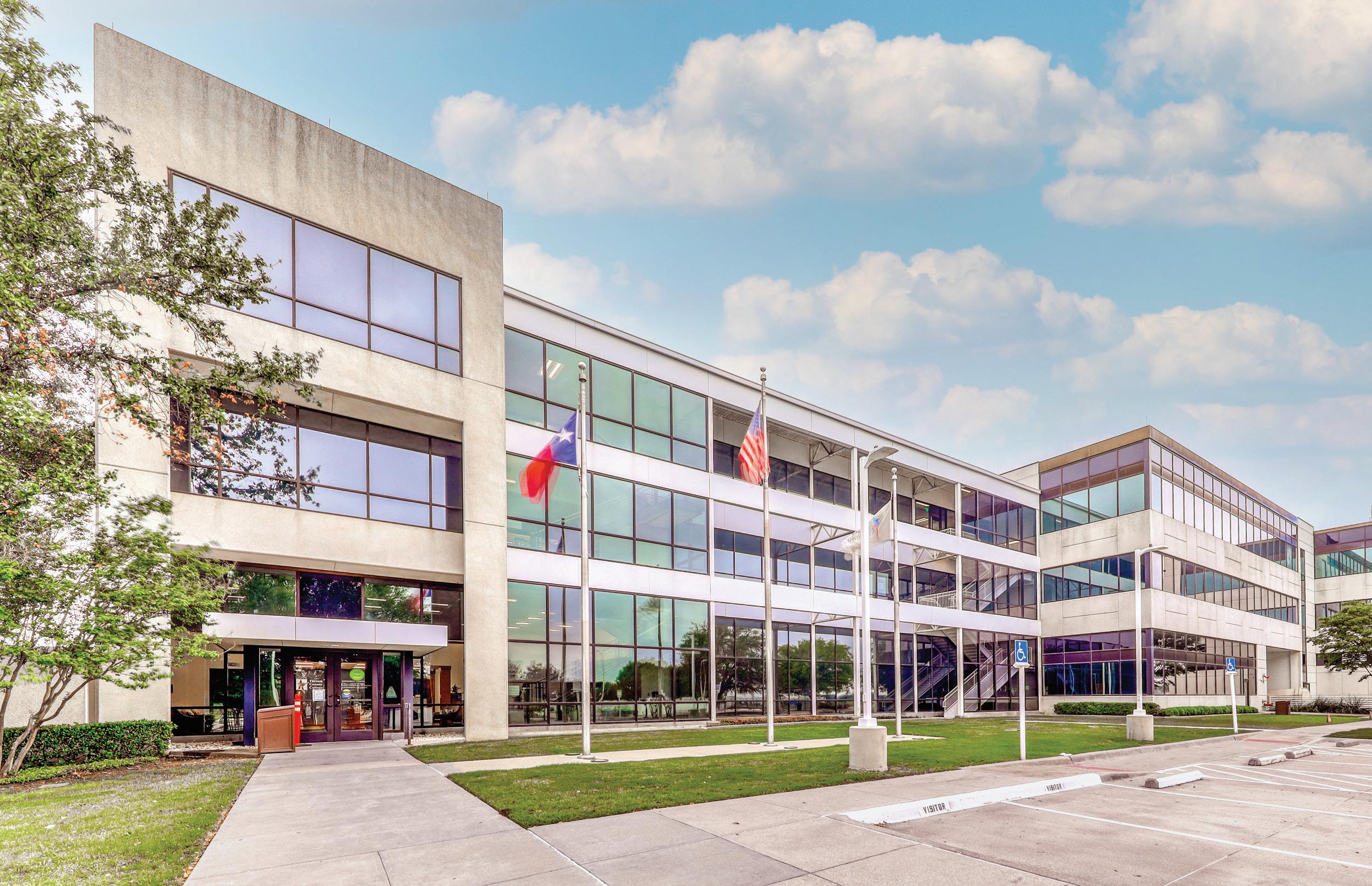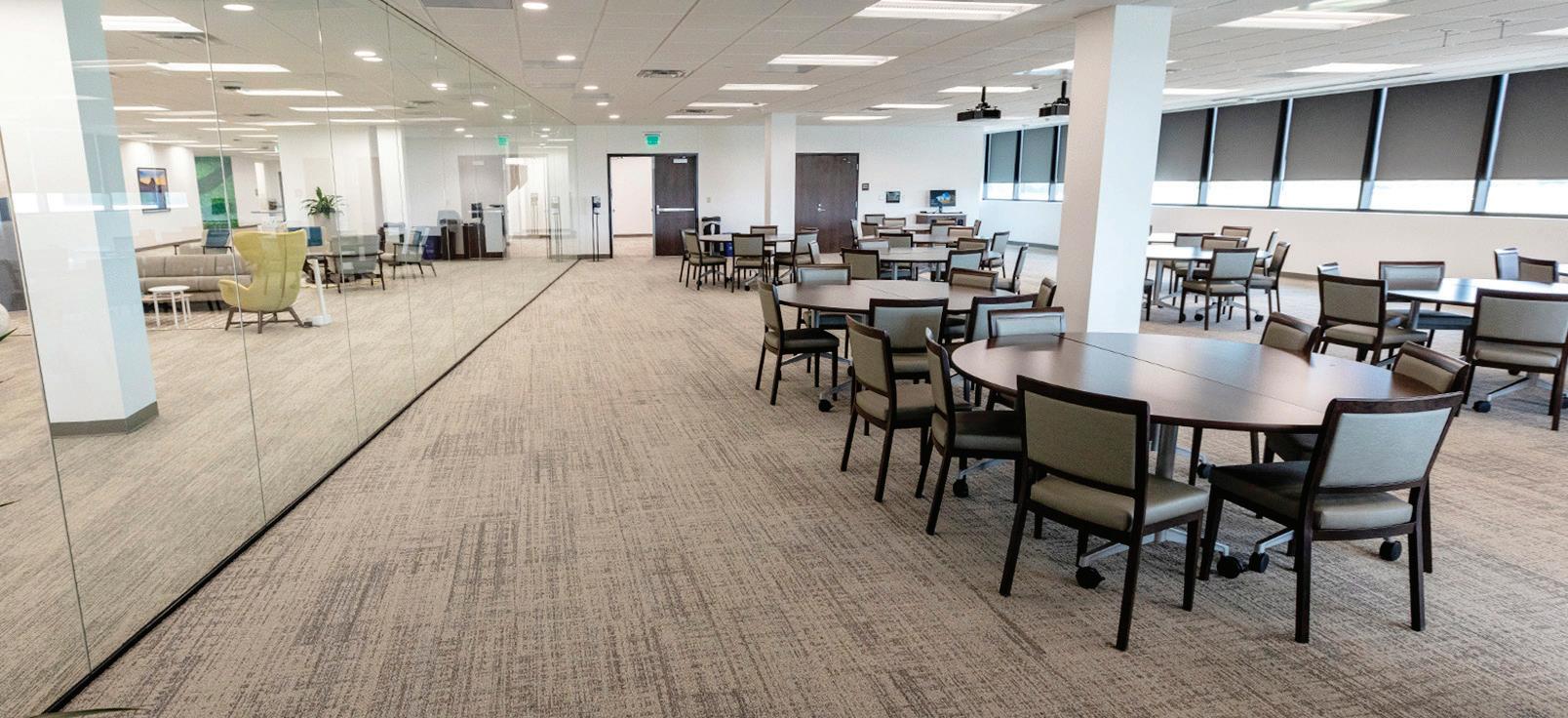Anatomy of Entrepreneuran blueprint








A Message From the Chancellor
Entrepreneurs are the backbone of economic development. Small businesses make up the vast majority of American companies, according to the U.S. Small Business Administration, and Tarrant County College is proud to support those businesses throughout our region. We’re also proud to join with likeminded organizations to provide a comprehensive network of resources that enable small businesses to grow.
From the very beginning of an entrepreneur’s journey, TCC is there. Our Everyday Entrepreneur Venture Fund (EEVF) helps new business owners in Tarrant County take the next step, providing education, mentorship with an established entrepreneur and even seed funding. Every aspect of EEVF is tailored to the needs of each participant in a way that reflects the current, authentic experiences of local small business owners.
The College’s academic programs include Entrepreneurship & Small Business Management, which teaches the skills necessary to start and operate a business. The program provides handson, real-world experience with expert faculty, and students graduate with an executable business model and tools to help them throughout their career. Members of the business community advise all of our workforce programs and partner with us in the development of new programs that reflect the ever-evolving business environment.
Businesses also turn to TCC to maximize their effectiveness. The Corporate Solutions & Economic Development department works with companies, economic development organizations and industry associations to cultivate a skilled workforce for Tarrant County. Our experts rapidly create customized learning solutions for long-established businesses as well as
startups, while focusing on the development of a company’s greatest asset: its people. In addition, the Corporate Solutions department provides the business community with event and training space, skills development courses and more opportunities for learning and networking. Furthermore, the Corporate Solutions & Economic Development team works closely with the Tarrant Small Business Development Center (SBDC), which offers a wide range of services at no cost to entrepreneurs.
TCC recognizes the value of small businesses and works earnestly to ensure that entrepreneurs have access to the guidance and resources they need to thrive. It’s essential to continue expanding the opportunities mentioned here and others detailed in this issue of The Lens . The TCC Board of Trustees and leadership continually seek out new ways the College can serve small businesses, partner with other organizations and help maintain a favorable economic climate for Tarrant County and beyond.
Of course, this magazine itself is another way we support entrepreneurs and business leaders—connecting you to trends, information and the people making an impact in our community. We hope you’ll find these pages enlightening and useful.
Elva Concha LeBlanc, PhD chancellor, tarrant county college district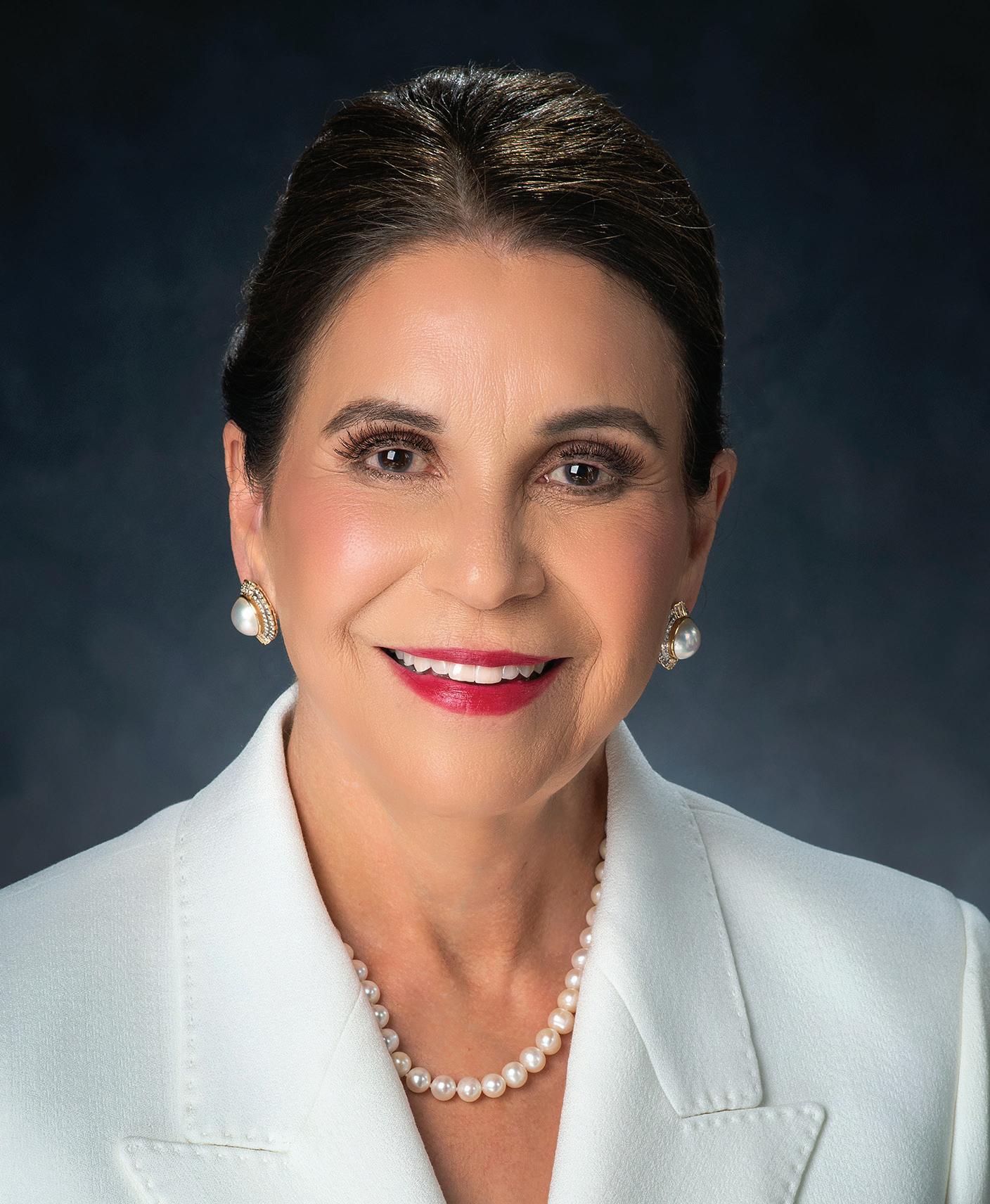

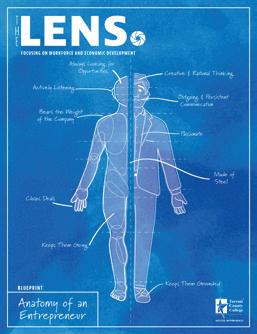

For years, the word “entrepreneur” conjured images of iconic and important people in my mind: Henry Ford, Estee Lauder, Steve Jobs … you get the idea. Then one day, I became an entrepreneur.
I find the articles in issue 7 of The Lens both fascinating and, surprisingly, relatable. I never thought of myself as having the qualities it would take to find success by “hanging out my own shingle.” Similar to Darlisa Diltz (“Inspiring Ingenuity,” page 15), I had no experience and never thought of starting a business. However, an opportunity presented itself to me and a friend, and we jumped right in without truly understanding how to operate a small business. So, similar to Jeff Hoferer and Shawn Shinneman (“Accidental Entrepreneurs,” page 18), my partner and I became accidental entrepreneurs of our own making.
Our business involved commercial aircraft maintenance and securing contracts in several states with air carriers in the crazy world of airline operations. We had technical expertise, credentials, operational capability and even a level of financing. What we didn’t have was a clue about running a business. We learned by trial and error the complexities of bookkeeping/ accounting, payroll, contracting, etc. We also learned that small business owners work … a lot. We literally had a room at our leased facility set up as a bedroom because one of us was always there working a 24-hour shift until we had enough cash flow to hire help.
The first three years of the startup were, without a doubt, the hardest I have ever worked. It was exhausting and scary. More than that, it was unbelievably rewarding. Indeed, our takeoff was somewhat turbulent, but when we reached our cruising altitude, the sky cleared up. We depended on each other and our families during that crazy time. I’m proud to say that we were successful, and our business was eventually bought out by a larger company that wanted our contracts and market territory.
Reading through this issue of The Lens, I realize there are so many resources out there that I wasn’t aware of, or that simply didn’t exist back then. I would have jumped at the chance to participate in the Everyday Entrepreneurship Venture Fund at Tarrant County College (page 21) or to have worked with the Small Business Development Center (page 39). Potential access to capital is always helpful, but mentorship and business training is incredibly important to anyone trying to run a small business. Learning business practices from those with expertise and experience is a tremendous resource.
From this accidental entrepreneur’s desk, I hope you enjoy this issue of The Lens as much as I have. The writers and subject matter experts are successful people with real world experience and advice. Many of them have worked with our students at Tarrant County College who are taking classes in our Entrepreneurship and Small Business program.
Who knows? Perhaps you are interested in hanging your shingle out there one day.
J. Clinton Grant dean | business, technology and transportation
J. Clinton Grant Dean | Business, Technology and Transportation

Jacquetta Dantzler Director of Business Development
Princess Jackson Program Administrator
Jennifer Villaire Executive Assistant
CHANCELLOR
Elva LeBlanc, PhD
Teresa Ayala, President
Kenneth Barr, Vice President
Jeanne Deakyne, Secretary
Leonard Hornsby, Assistant Secretary
Shannon Wood
Laura Forkner Pritchett
Gwendolyn Morrison
EDITORIAL ADVISOR

Reginald Gates
All material is strictly copyright protected and all rights are reserved. No part of this publication may be reproduced in whole or in part without written permission of the copyright holder. All information and data are correct at the time of publication. Opinions expressed in The Lens are not necessarily those of Midwest Luxury Publishing, and Midwest Luxury Publishing does not accept responsibility for advertising content. Any images supplied are at the owner’s risk and are the property of the owner.
shelbi ankiewicz
Journalist, world traveler and a native of Myrtle Beach, South Carolina, Shelbi is a regular contributor to visitmyrtlebeach. com. She has also worked with the USA Today Network and Avenel Financial Group.
jennifer blalock, edd
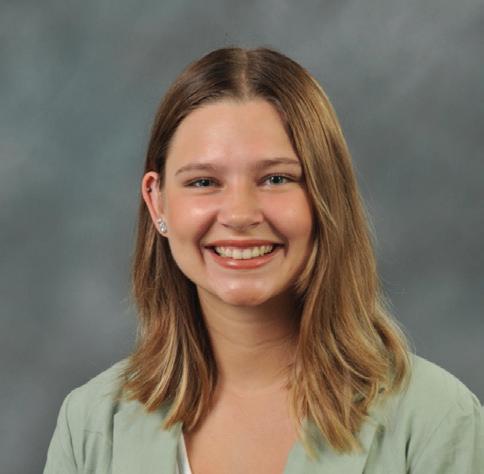
Jennifer has spent over two decades leading teams in postsecondary education and municipal government. As the CEO of InJenuity Solutions, Jennifer develops, facilitates and evaluates workforce, economic and organizational development programs.

heide brandes
Based in Oklahoma City, Heide is an award-winning journalist whose work has appeared in Forbes, The Wall Street Journal, The New York Times and The Washington Post, among others. She is also a historic re-enactor and an avid hiker.

tom delamater
Tom is an Ohio-based writer and editor, and longtime communications consultant to corporations, nonprofit organizations and educational institutions. He is the former chief communications officer at Collin College.

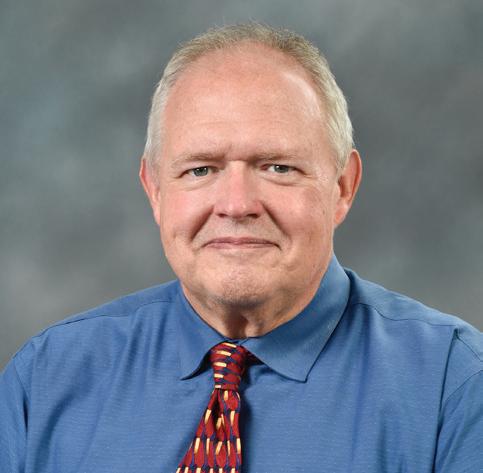
ian fitzpatrick, esq
An award-winning journalist, Ian has written and spoken about workplace diversity and travel topics around the world. Based in Silver Spring, Maryland, he practices law in Maryland and Washington, D.C.
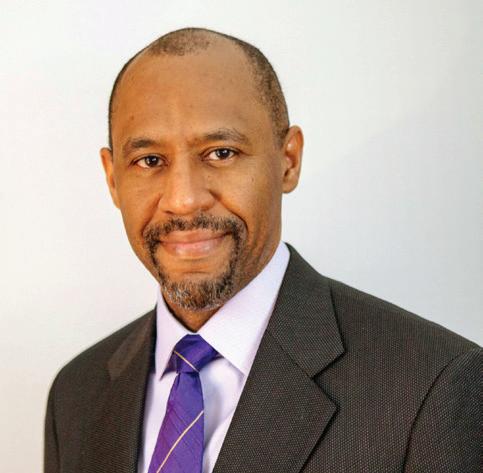
rick gosselin
A longtime sports reporter and columnist for The Dallas Morning News, Rick has covered the NFL for 50 years. He was enshrined in the writers’ wing of the Pro Football Hall of Fame in Canton, Ohio, in 2004. He is the featured columnist for The Lens

shika hershel, phd
Shika has published articles in various commercial and educational journals. She is also the former team photographer for the Texas Rangers. Shika currently works in risk management at Charles Schwab & Co.
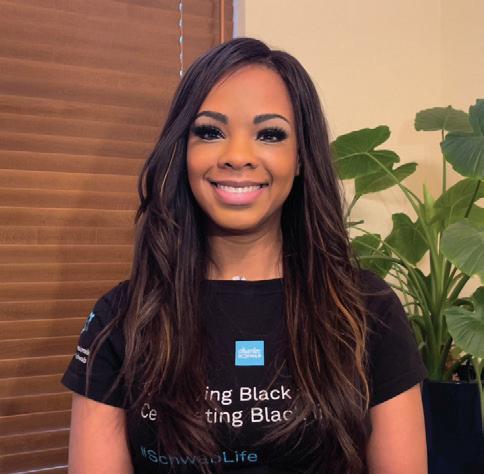
tyler hicks
Tyler is a freelance writer from Austin, Texas. He is a frequent contributor to a host of local media including the Dallas Observer, D magazine and Local Profile. His work has also appeared in American Way and Island Soul magazines.

jeffrey ranta, phd
A college professor, business owner, military veteran and freelance writer, Jeffrey provides strategic, creative and tactical advice to clients including the U.S. Navy, CocaCola, Chick-fil-A, Ford Motor Company and the Departments of Defense and Transportation.
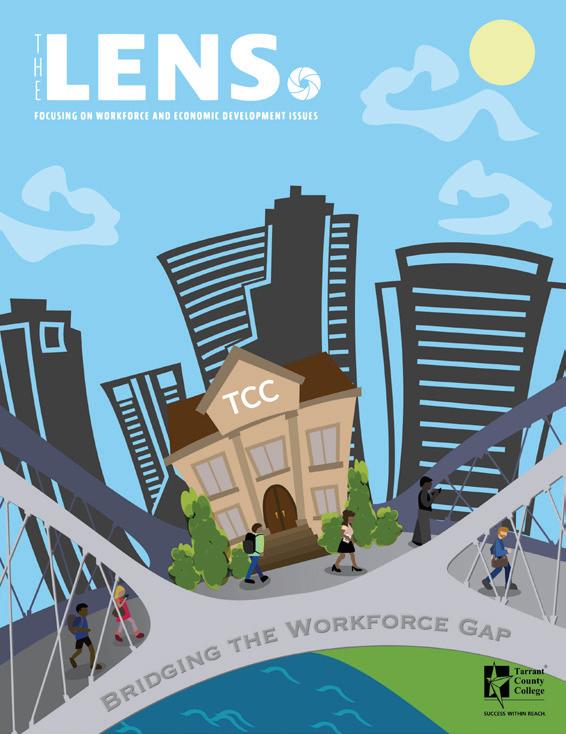



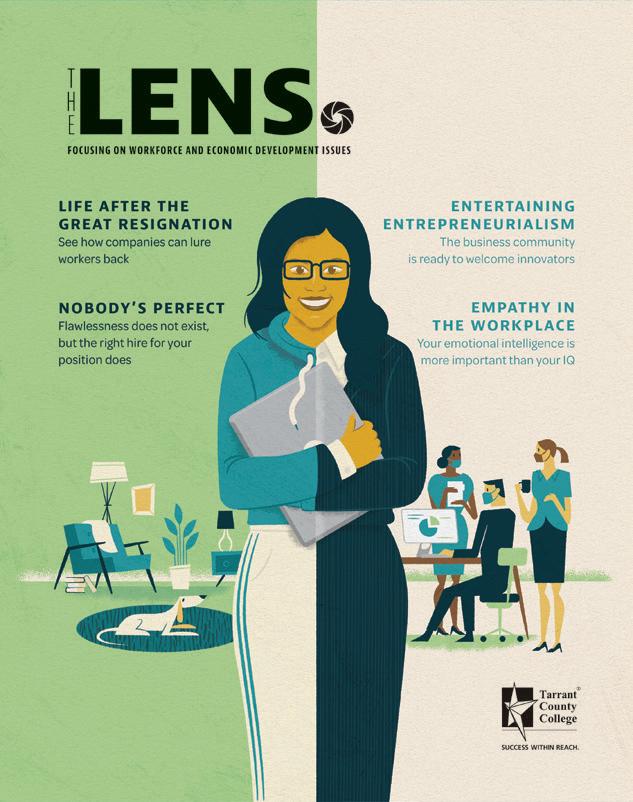

Advertising in The Lens magazine doesn’t just align your organization with high-quality content in an award-winning publication. Being part of both the print and digital editions of The Lens also puts your business in front of thousands of readers, including Tarrant County executives, entrepreneurs and economic development professionals. Secure your spot today to reach the decision-makers you want as clients.
for advertising opportunities, please email our publisher at info@midwestluxurypublishing.com we look forward to working with you!
The stats behind one of the most entrepreneurial-friendly markets in the country.

For many, the primary lure of launching an entrepreneurial venture is the perceived freedom, autonomy and selfdirected opportunities of doing business on your own terms and conditions. Depending on what your day was like at the office, you’ve likely entertained the idea of breaking away from your traditional 8-to-5 corporate job and considered doing things your way.
That inclination to bet on yourself in business has become even more enticing and accessible for many, as social media, the gig economy, the disruption of the traditional workforce and the explosion of e-commerce have broken down traditional barriers to offering business and services as a one-person operation. According to a 2019 paper by Boston-based brand strategy consultancy Spencer Brenneman, LLC, there are 41.8 million working adults in the United States who fall under the label of “solopreneurs,” meaning they manage their products and services as an individually run business. Solopreneurs contribute more than $1.3 trillion to the nation’s economy.
While the hype about entrepreneurial start-ups seems attractive to those who thirst for professional independence, the road to business profitability for solopreneurs still demands building a powerful network of industry colleagues, business peers and, most importantly, new and returning customers. That’s why the winding road of becoming a solopreneur isn’t for everyone: It can be overwhelming to stay motivated, keep connected and avoid burnout when all the responsibilities fall on the person at the top: You.
These six successful solopreneurs are independently navigating their way in some of the nation’s hottest business markets. They shared with The Lens the best ways to overcome the loneliness
by jennifer blalock, eddof building and operating a business as a party of one. Here’s what these movers, shakers and business innovators had to offer about adding some social sizzle to their work life and expanding their solopreneurs’ footprints to keep connected and inspired as they elevate their brands.
Florida-based author and business coach Leonard Chatman, Jr., runs and manages Chatman Speaks, LLC, a one-man show offering business training, keynote presentations and workshops. He makes sure his daily work routine includes going to “the office” every day, which is a comfortable booth at the neighborhood coffee shop.
“As a business owner, your routine is your heartbeat,” Chatman says. “Each day, my feet hit the ground by 5:30 a.m.” Once he’s settled in, he not only fills his own cup with caffeine and conversation, but he also leverages his interaction with the baristas and other customers to expand his brand.
“I make my rounds greeting everyone, wishing those I speak to a ‘great day on purpose,’” explains Chatman, who has earned the nickname “The Relationship Architect” from his peers. He believes the routine and the positive relationships he cultivates inspires his mission mindset and hones his focus so he doesn’t become an isolated, lonely solopreneur.
Corley Randolph, CEO of The Frameworks Group, a public relations firm that operates throughout North Texas, regularly schedules time for meetings and client research at one of his community’s new state-of-the-art libraries. He credits the positive energy of the modern public space with keeping his ideas fresh
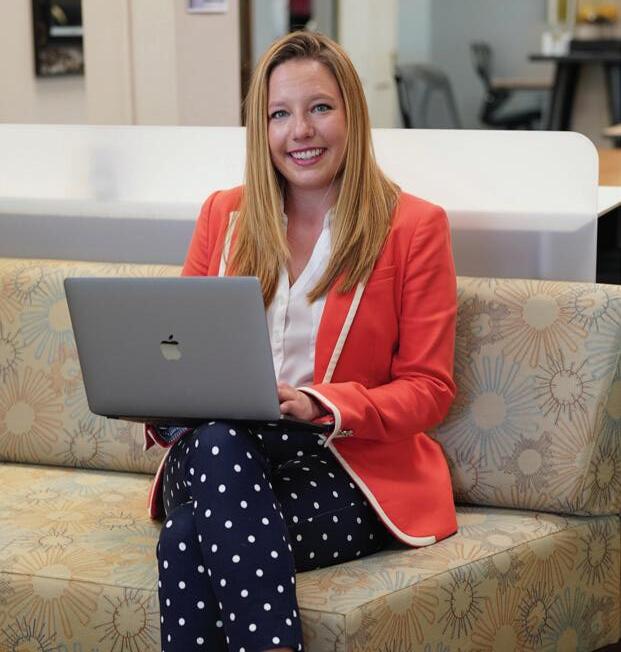



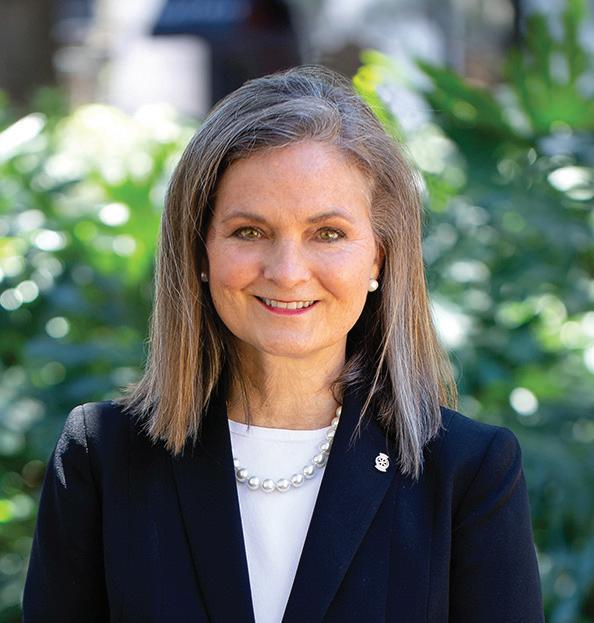

There are 41.8 million working adults in the United States who fall under the label of “solopreneurs,”
meaning they manage their products and services as an individually run business.
and his client relationships sharp. Then he dedicates time on his calendar to follow-up with individuals he’s met, booking coffee connections and continuing the conversation.

“It’s the real connections that make all the difference,” Randolph says. “I’m relentless about developing genuine, long-lasting business relationships.”
Randolph offers a new take on the business saying, “It’s not what you know, but who you know,” countering, “I believe it’s more about who knows you and believes in your vision.”
All of the solopreneurs The Lens spoke with recommended joining a team or teams. Finding the right fit for a philanthropic, civic or professional association, or group of like-minded individuals who are chasing similarly aligned goals, has proven invaluable to their experience.
Marjorie Young, president of Carriage Trade PR in Savannah,
Georgia, and author of Reputation Matrix, advises solopreneurs to not just join chambers and professional business affinity groups, but lean into leadership roles. “Don’t just be on the local nonprofit board, be the president,” she says. “It puts you in circles that include major decision makers.”
To maximize the return for the time invested in volunteering in a group, make intentional choices about which ones you throw yourself into versus the ones where you’re a face in the crowd. “I got invited to a small referral group of four women in my business community. This helped us form a relationship of trust, becoming the eyes and ears for one another’s businesses,” explains Young. “Over 92% of new business comes from referrals.”
April Purdie, who launched a flourishing Florida clothing boutique just two years ago, commits to staying connected daily with other business owners who offer services connected with her industry and who share her motivation.
“I make sure I surround myself and my business with like-minded individuals who are striving to excel in business, just like me,” Purdie states. She is known for her online media presence, going live with inspirational messages, posting the latest fashion arrivals and attending local galas, fundraising events and networking events wearing her brands and products. “I stay motivated and have high energy because I love what I do and I know my ‘why.’”
That even includes a phone call, an email or a pop-up, in-person one-on-one visit with a client.

In addition to managing a large real estate portfolio in a very hot housing market, Florida realtor Tinesha Tutt commits to connecting others in the business landscape. She credits the connections she coordinates between her clients and other small businesses and solopreneurs with strengthening her own book of business.
“The more your customers think you of you as a resource, the more they will leverage that relationship and stay in contact,”
Tutt says. This attitude has resulted in referral partnerships and her own signature networking events, including her annually sold-out Brunch and Boards business seminar.
“Networking can bring you to the one person or customer who can change your life forever.”
Megan Bond, a Texas marketing consultant and president of MB Marketing, launched into the solopreneur space, fully anticipating the challenges of doing it alone as the only entrepreneur in her family. Bond often builds connections and recharges her social battery by setting up shop at an area co-working space similar to Ensemble Coworking in downtown Fort Worth (see page 54).
“I’m most grateful for the community at the co-working space I come from,” Bond says. She also knows there are times to shut down and reconnect with herself and friends outside of her business. “Every year, I take a one-week vacation out of the country and I don’t get Wi-Fi access while I’m there. My ability to leave my business while it still runs smoothly is the difference between being a freelancer and a business owner.”
As one of the top 20 largest colleges or universities in the nation, Tarrant County College has something for everyone!





With more than 70 technical workforce programs, students can go directly from college to career in high demand fields. Creating


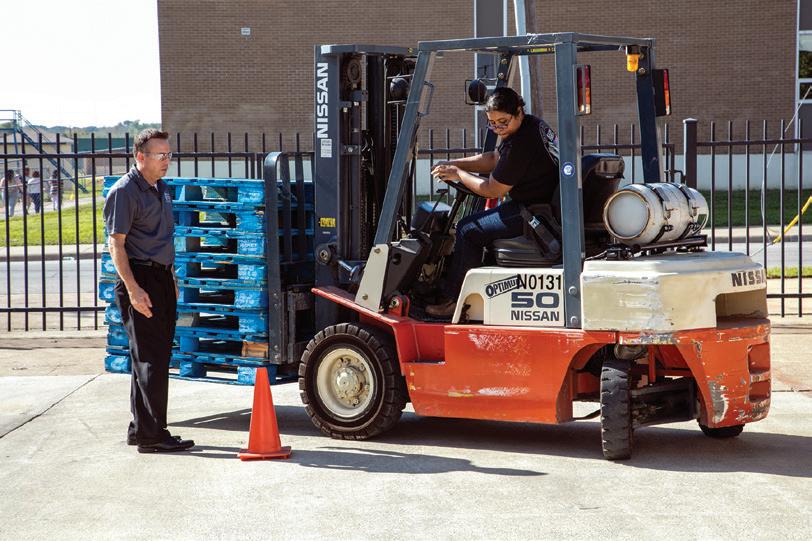

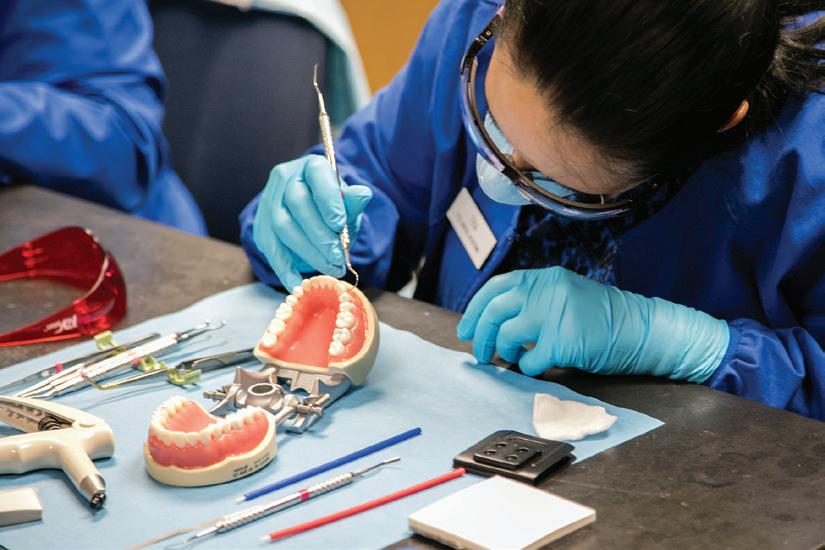
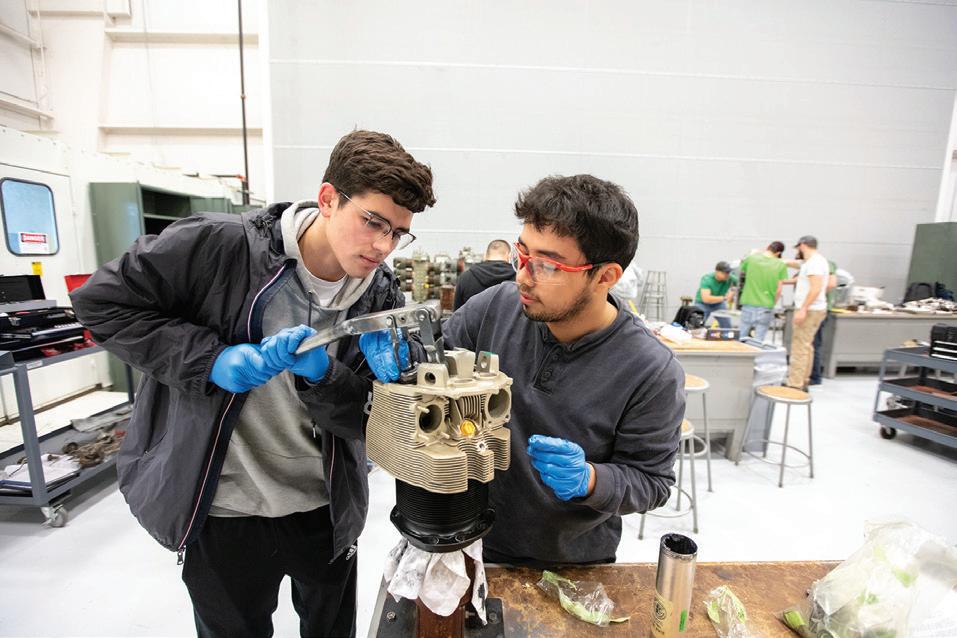

Darlisa Diltz, owner of North Texas Entrepreneur Education & Training (NTEET), neither expected nor wanted to become an entrepreneur. And she certainly never envisioned being someone who inspired others to start their own thing. The St. Louis, Missouri, native was happy working in the medical field, and while she didn’t particularly want to be involved in entrepreneurship, entrepreneurship wanted her.
“My entrepreneurial knowledge was very limited,” Diltz says. “I had no experience in entrepreneurship and I never wanted to be one. But I kept kind of getting pushed toward entrepreneurship.”




Diltz’s path was a winding one, but ultimately, she became the entrepreneur she swore she would never be, starting NTEET. The business is among the first nonprofit woman-owned and black-owned business service organizations in the Dallas/Fort Worth area, with a focus on pre-venture and startup entrepreneur education. She doesn’t lend money herself, but she does make
it easier for those starting their own journeys to navigate all the different avenues of funding and resources.




Think of it as an in-depth workshop on how to start your own business, where all the information and resources are taught in one place instead of having to research multiple agencies, organizations or training for the same information.














Before 2020, NTEET’s goal was to be a catalyst for other business support organizations such as the Small Business Development Centers (SBDC), the Women’s Business Enterprise Alliance and learning institutions to help bridge the gap between entrepreneur startups and the failure rate of startups.


“Our focus and our lens is specific to foundational development. We do that by way of education, because knowledge is power, right?” Diltz says.


TCC's Everyday Entrepreneur Venture Fund is here for you.
Are you an aspiring entrepreneur with dreams of business ownership? Tarrant County College's Everyday Entrepreneur Venture Fund (EEVF) offers business owners a specialized program that includes customized education, mentorship and seed funding to help create a successful startup and sustainability of a new business. While the program is only open to businesses in Tarrant County, it is available to both students and non-students. Because most new businesses fail within the first two to five years, according to the Bureau of Labor Statistics, eligible applicants must have been in business for three years or less with total revenues to date of no greater than $500,000. For more comprehensive coverage about the EEVF, see page 20.
Prior to the pandemic, NTEET developed a program similar to college entrepreneur programs but with more practical, hands-on training. The first 12 weeks focused on in-class education ranging from how to do marketing, budgeting and market research to funding sources and even business development strategies.
The next 12 weeks of the program focused on actual implementation. Clients put the knowledge they had just learned into action—they did the market study, they approached funding sources, they wrote their business plans and they developed growth strategies.
“We helped them practice pitching and connected them with service providers like the SBDC, where they pull research and data. They used that data to determine their target market and marketing efforts,” Diltz says. “They had to do a certain amount of in-the-field work like attending vendor events and networking events, and they had to bring back deliverables. There was a lot of different things that they had to do under the implementation umbrella to understand what it takes to be an entrepreneur.”
Deidre Kindred was one of her clients. Owner of Your Healthcare Nurse Advocates, an independent patient advocacy organization, Kindred says she learned persistence and tenacity toward continuous growth through NTEET.
“Darlisa and I met around 2018 and she has been my accountability partner ever since,” Kindred says. “She heard about my business idea at a conversation, and she has inspired me to go for it in every way possible. Darlisa's purpose is to inspire entrepreneurs and small business owners that it can be done, but with hard work and persistence.”
After the pandemic, however, the organization had to switch gears. Because NTEET worked with a class of entrepreneurs who ranged from pre-venture to those with upward of $50,000 in revenue, finding those beginning-stage students who were willing to sign up for a six-month program became difficult.
So Diltz transitioned into a partnership model, now working with independent organizations, nonprofits and schools to develop, implement and facilitate their own entrepreneurial focus programs. She also targeted community development financial institutions and lending institutions, as well as Tarrant County College’s Everyday Entrepreneur Venture Fund Committee to help connect TCC with “want-trepreneurs.”
“We had done some work with Tarrant County College prior to the pandemic, so when the opportunity for the Everyday Entrepreneur Venture Fund committee came up, TCC asked me to be a part of the committee to develop the program. We've been a part of it from the very beginning.”
In Missouri, Diltz worked in health care in a back-office role managing projects and setting up training. She was part of the team tasked with the conversion from paper to electronic medical records.
“I was on the project team going around several states training on how to implement the new records,” she says. “Most people get out of high school, go to college, get a degree and climb the corporate ladder. I never had a corporate ladder to climb. Mine was always kind of like a faith tool. I got pushed into entrepreneurship because I like helping people.”
Because of her skill with training her colleagues, she found she was a natural teacher; however, she still had no desire to actually become an entrepreneur.
While working with Missouri’s health care system, a friend approached her about helping a new nonprofit build its strategic plan. Diltz signed on and discovered that her knowledge of planning and organization was in high demand. That nonprofit started referring other people to her for similar work.
“They were paying me and I'm like, ‘This is not cool because I don't think I'm supposed to be just getting money like this,’” she recalls. “So, I independently researched what being an entrepreneur
entailed, and I started doing all these free classes while working my full-time job. I was helping people understand how they could be entrepreneurs.”
Little did she know that a representative from the St. Louis Small Business Development Center was coming to those sessions to watch her lead the training. She was approached with a contract opportunity to share her grassroots knowledge through the SBDC. She parlayed that connection into a full-time job with the SBDC in Texas. After relocating to the Metroplex, Diltz took a major leap of faith and started her own business, North Texas Entrepreneur Education & Training.
In 2022, her organization led Global Entrepreneurship Week for all of North Texas. She had been a community volunteer for GEW since it began, and when the original organization leading GEW was let go, she stepped up.
“Under my leadership, we rebranded it from GEW Fort Worth to GEW North Texas,” she says. “We served all of the four major counties, hosted 160 events across the Metroplex, and each major municipality was able to host an evening networking session for its community.”
These days, Diltz helps Tarrant County College’s Everyday Entrepreneur Venture Fund (EEVF) through her role on the advisory committee (see sidebar). The EEVF is designed to help aspiring entrepreneurs become successful business owners. The program
offers customized education, mentorship with a small business professional and seed funding to assist with the successful startup and sustainability of a business.
“Many of the staff at TCC that are involved in the entrepreneurship fold know me from either working on a project together as a partner or because of the work we have done in the community.”
The EEVF allows entrepreneurs the opportunity to access not only funding for their business, but the proper education and tools needed to grow and develop the business over time.
“Understanding the intricacies of running a business is important, and the entire process of EEVF helps with that—from the initial documents they have to prepare and submit, to the presentation, all the way through the program follow-up,” she says.
Diltz’s legacy continues in Tarrant County and beyond with ongoing success stories like that of Charletra Sharp, director for economic mobility for the Center for Transforming Lives (CTL), whose mission is to disrupt the cycle of poverty for women and their children in Tarrant County.

“The pandemic resulted in several first-time families in need of public benefits due to job loss and reduction in hours,” Sharp says. “This tragic event led to an influx of existing business owners—and new ones—seeking support to deploy new business models to recover lost finances. Darlisa Diltz's experience as an entrepreneur and adviser working with BIPOC (black, indigenous and people of color) entrepreneurs made her a unique and necessary member to our team.”

“I had no experience in entrepreneurship and I never wanted to be one. But I kept kind of getting pushed toward entrepreneurship.”
— Darlisa Diltz OWNER NTEET
Sometimes becoming a business owner happens organically. by tyler
Jeff Hoferer started his first business for a very simple reason: He loved music, and he found a way to get it for free.
While enrolled at Kansas State University, the Southlake native and future film producer and director started an online zine that published music reviews. It wasn’t necessarily the most balanced publication—by his own admission—but it gave Hoferer a brief taste of what it would be like to make money from something he started himself.
Decades later, the 46-year-old is still turning his passions into profits, even when he doesn’t initially plan to.
Hoferer works as a senior producer at Fanatics, Inc., an online retail company for sportswear, sports collectibles and trading cards. His journey into the sports merchandise industry stretches back to at least 2010, when he started producing videos of himself unwrapping packs of baseball cards. That hobby then led to his own company, PackGeek, as well as a web series and production company following Hoferer and other hobbyists as they search for valuable cards and other memorabilia.
“I’m now working for the company that owns Topps, which is the same brand of cards I used to open as a kid,” he says. “It’s a wild, full-circle ride, and it all happened by accident.”
That’s not to say Hoferer doesn’t put work into his passions; quite the opposite. In fact, accidental entrepreneurs have some of the most salient lessons to offer anyone interested in a career in business.
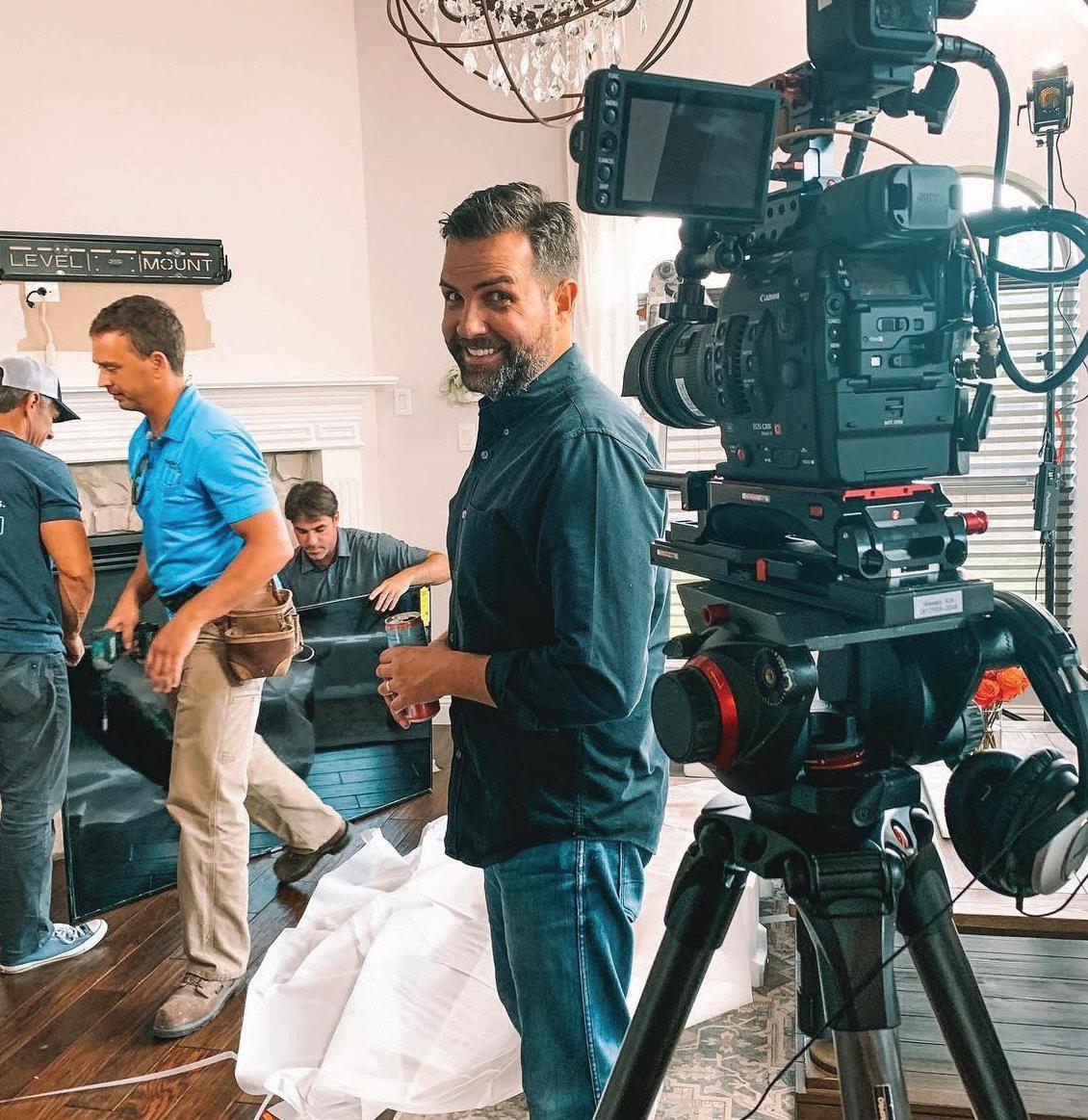
Hoferer and other entrepreneurs interviewed by The Lens emphasize that a key part of any entrepreneurial venture is doing work that you don’t like, or maybe even hate. That way, you’re focused on pivoting to something you love. It’s important to know this fact going in, otherwise you may start your business with unrealistic expectations, or worse, you may get stuck in a mediocre job and never give your true passion a try. In any event, accidental entrepreneurs don’t quit their day jobs while they’re still in career limbo.
“Well before you venture out on your own, you need to think about what you would need to do to make it into a full-time
hicksbusiness,” says Scott Bedgood, a Metroplex-centric journalist who started his own writing business. “If you're doing it because you love it, it might be hard to do it if you're depending on it for rent. Even professional baseball players are sometimes like, ‘Oh my gosh, I have to go play a baseball game tonight.’”
Hoferer and Bedgood share a similar backstory. Like the baseball card-loving entrepreneur, Bedgood started a newsletter because he loves to write and he loves to try new things (even when they’re painful or dangerous). His newsletter, Trial & Error, features the 31-year-old Bedgood testing a product that zaps you for bad habits, as well as learning the fine art of beekeeping and alligator wrangling. He monetized the newsletter, and his witty, engaging writing style caught the eye of a publisher looking for
Shawn Shinneman never dreamed he’d start his own content marketing business, but while working at a marketing agency, he realized there will always be high demand for marketers with strong writing skills. Now he’s in the middle of his second full year as an entrepreneur, and he says networking with fellow marketers and business owners in his field has been more instructive than any business textbook.
“From pricing to project management and all kinds of other tips, the network I’ve made has probably been my biggest asset,” Shinneman says. “You’ve gotta find your people.”
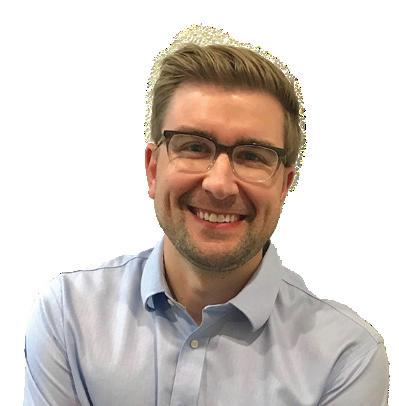

Then, once you find them, it’s important to frequently check in and cultivate relationships. Bedgood says that people in your network may turn into clients one day, and as an entrepreneur—accidental or not—client relationships and word-of-mouth are vital fuel for your business.
“When you’re just starting out,” Bedgood notes, “using one connection to get to the next can be the thing that keeps you going.”
ghostwriters. At press time, Bedgood’s first ghostwritten book—a memoir by a fitness entrepreneur and motivational speaker—had just been released. It was a high point in a freelance career that has been full of ups and downs.
“Sometimes being an entrepreneur means failure,” Bedgood says. “I freelanced for a full year, and I was very strategic and approached it like a business, which is exactly what it was.
“But it was the start of 2020,” he adds, “so even though I made a ton of connections and got better at what I do, the business side just dried up.”
His wife recently found herself in the exact opposite situation.
Sami Bedgood knew she had a knack for baking and decorating cookies, but she didn’t expect her homemade baked goods business to take off the way it did. “It went from a passion to a huge burden,” her husband notes. “It would be 2 or 3 in the morning, and she’d be working on cookies. It became unsustainable; she had to stop advertising as much. She had too much business.”
Therein lies another important lesson: Know your bandwidth before you take the plunge (especially if you take the plunge alone).
At the same time, everyone interviewed by The Lens acknowledged there is no singular blueprint for entrepreneurship.
For instance, Hoferer grew up thinking he had to live in Los Angeles if he ever hoped to “make it” in film and television. He was despondent when his parents wouldn’t pay for film school, then dejected when he struggled for years to land jobs in Hollywood after moving from Southlake. Yet after moving back to D/FW, he realized skills and community were far more important than geography. He landed several jobs producing films and videos, and it all led to both his current full-time gig and his side business with PackGeek.
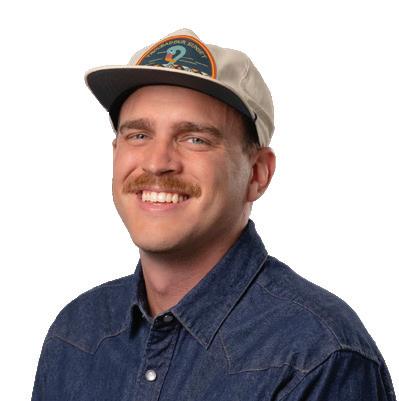



To him, the lesson is clear:
Focus on what you know and are good at, use that to break into the industry of your choice, then branch out from there.
“I think everyone should figure out their own path,” he says. “There’s always going to be the path that people think is the only one to take, and if you stray off it, there's a perception you won't be successful. But that’s not true. The path is there, waiting for you to find it.”
“There’s always going to be the path that people think is the only one to take, and if you stray off it, there’s a perception you won’t be successful. But that’s not true. The path is there, waiting for you to find it.”Scott Bedgood JOURNALIST Shawn Shinneman FREELANCE WRITER — Jeff Hoferer SENIOR PRODUCER FANATICS, INC.

TCC’s Everyday Entrepreneur Venture Fund is a success story generator.
 by jennifer blalock, edd
by jennifer blalock, edd
The global marketplace continues to expand, inviting more start-up owners to consider taking that entrepreneurial leap and launch their own business. But for many, the knowledge gap between a great idea and a profitable endeavor can be turbulent and challenging. What was once an enjoyable hobby can quickly transition into a confusing muddle of point-ofsale transactions, staffing issues, prolonged production timelines and other real-world entrepreneurial realities that threaten some people’s lifelong dream of business ownership. Business owners in the trenches of transitioning from struggling concept to commercial success already lack time and funding, making the idea of hiring a coach or enrolling in business courses to help upskill in critical management areas seem like another distant dream and out of reach option.
Enter Tarrant County College’s innovative program, the Everyday Entrepreneur Venture Fund (EEVF). This pioneering initiative was developed as a method of connecting the community’s fast-growing entrepreneurial and start-up business owners with the support and skills they need to succeed.

Beginning in 2021, the program was funded by initial sponsors Chip and Stuart Weismiller and supported by TCC’s designation as the only community college in Texas to be named a phase two recipient of EEVF by the National Association for Community
College Entrepreneurship (NACCE). The Weismillers established the million-dollar venture fund to provide seed grants to community college foundations in support of new business start-ups in the communities they serve.
What is the EEVF? A competitive selection program in which aspiring and early launch business owners submit applications to join by cohort. Those selected embark on a free year-long cadre of coursework, seminars and mentorship. Additionally, those who complete the program earn a stipend to utilize as a much-needed financial jolt during those lean times in the critical first years of business operations. Entrepreneurs have used the funding for websites, marketing and advertising, giving them the opportunity to stretch their start-up dollars further. The program’s business launch methodology is based on three key components:
1. Stress-tested idea development
2. Business planning
3. A unique community-based mentoring program partnering those selected to participate with seasoned entrepreneurial mentors who have been where they are
Lourdes Ramboa, chair of TCC’s Business & Entrepreneurship programs, customized the curriculum to ensure the content would reflect the authentic experiences of entrepreneurs in Tarrant County.
“We have each entrepreneur complete an initial assessment, which helps us best diagnose their specific, individual educational needs,” Ramboa says. “Once this diagnosis is complete, we then develop a customized learning program. This may include a business development plan, social media marketing, financial management, etc. Our goal is to provide an entrepreneur with the knowledge they need to get their business to the next level.”
Annually, there are two cohorts selected, with applications available online. Eligibility requirements include:
Business must be located in Tarrant County
Must be in business for three years or less
• Total revenues to date for applicant businesses should be

no greater than $500,000
Applicants must submit a business plan, current marketing or social media plan, a one-page cover letter detailing the
The EEVF program at Tarrant County College is committed to continuing to host two new cohorts annually of aspiring and inmotion entrepreneurs in the coming years. For these burgeoning businesses and their owners, the payoff for participation has been invaluable, including a seed investment or grant of varying amounts based on the power of the pitch and the advisory group’s recommendation.
“Outside of the support of my family’s initial investment, TCC and this program were our first investors,” says Charletra Sharp, who started Cup O’ Vibes coffeehouse.
To learn more about the EEVF program and how to apply for the next cohort, visit corporate.tccd.edu/eevf, call 817-515-7821 or email corporate.solutions@tccd.edu.
amount of funding requested and how it will be used, a resume and a one-to-two-minute pitch video explaining the business. If selected, over the next year, each cohort member receives customized courses focused on business and management competencies as well as mentorship, with monthly individualized mentor sessions from a seasoned business entrepreneur who has traveled the path before.
The EEVF is groundbreaking in its commitment to translating the textbook principles of entrepreneurship fundamentals into daily practice, as these business owners are often launching in real time, driven by a dream and a desire. The Lens spoke with some of the program’s recent graduates to see how these enterprising individuals are leveraging this new knowledge into a profitable business and financial freedom.
Standouts Ana Ambriz and Charletra Sharp jumped at the opportunity to join the inaugural class, each inspired by new business ideas they’d been considering and were eager to launch. Ambriz, a single mother of four, was motivated by the growing importance of establishing diverse financial revenue streams to support her family and creating a solid legacy to pass on to her children. She established AMP Materials, a materials management company that specializes in supplying reinforced rebar steel for commercial building projects. In the fast growth and business expansion climate of North Texas, Ambriz saw the opportunity and took a leap into a field where women are the exception, not the rule.
“I want to be a model of what you can create for my children,” Ambriz says. “They see me operate my business daily and I bring them in, trying to teach them everything I can. This is

something we are building together. EEVF helped me set the foundation and now, I’m passing down that knowledge to the next generation while still growing.”
Ambriz was already familiar with TCC, as she navigated the process of becoming a minority-certified business through the Historically Underutilized Business (HUB) program. She shifted into high gear with guidance from her EEVF mentor and Small Business Development Center business and financial officer, Kemmiko Grant. “They helped me understand how to obtain certifications, financial projections, bookkeeping and business taxes.” Ambriz also enjoyed exchanging stories and experiences with her EEVF classmates, many of whom were at similar stages in business development or who had been there before, as well as sharing her accounting and business acumen. “I didn’t feel alone. It was another layer of comfort, protection and knowledge.”
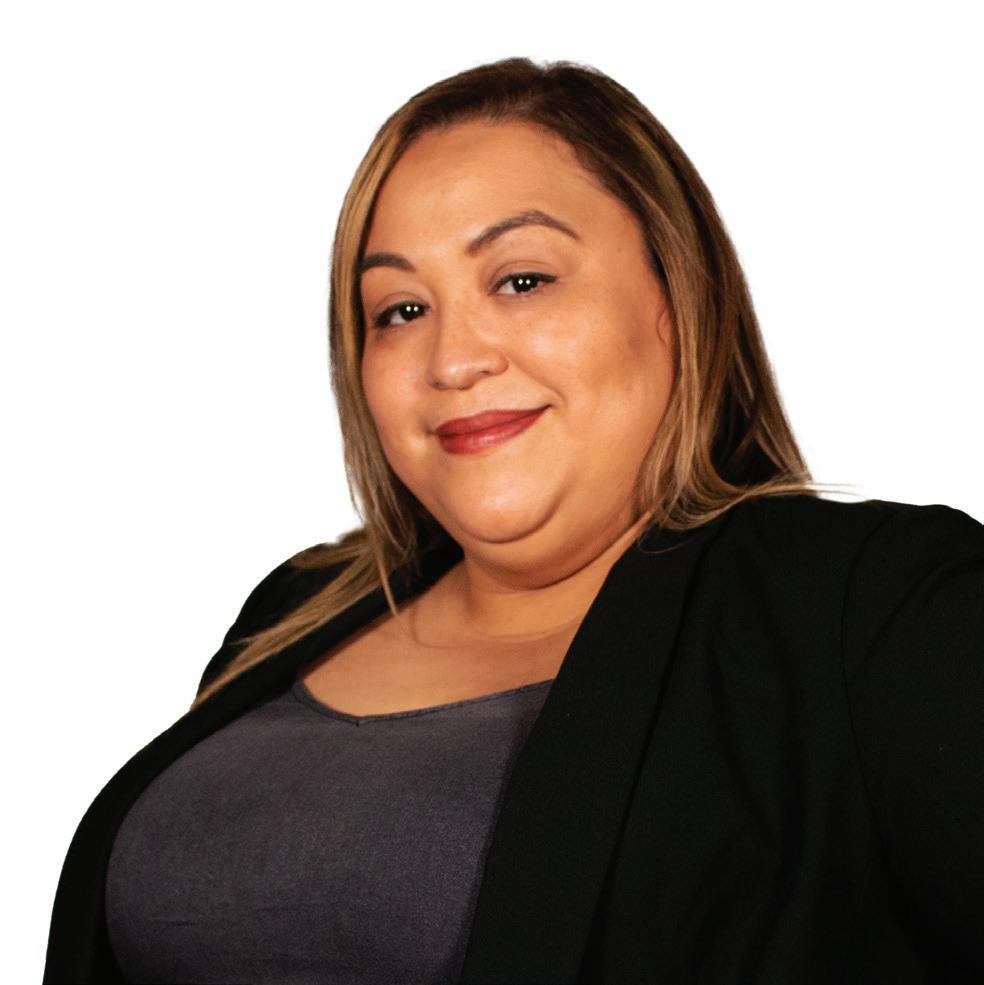
Sharp developed her business concept during the pandemic, identifying an opportunity for a specialty coffee and ethnic drink shop in her South Arlington neighborhood. She longed for the camaraderie of aromatic special brews and caffeinefueled conversations with people in her own ZIP code during a time when most were on lockdown. Cup O’ Vibes was born, and the java-based business continues to thrive.
“I found out about EEVF and it was my first time ever submitting an application like this,” she recalls. Not satisfied with her initial video, which she submitted minutes before the initial deadline, Sharp regrouped and resubmitted. “They ended up extending the deadline and I resubmitted my video.” Tarrant County College offers workshops prior to any EEVF cohort application period to help first-time applicants like Sharp feel confident in their submissions.
Though Sharp balanced the program while being a mom, wife, working her traditional 9 to 5, being an active participant in several community business networking groups and her local chamber, and launching the business, she found great value in the investment. “It helped me develop and refine my business origin story,” recalls Sharp, who presented it to the program’s review committee, which asked questions and helped her sharpen some of the plan. Additionally, she credits the overall EEVF structure for igniting her business launch. “The structure of having a business adviser, meeting with your cohort, learning from guest speakers who are sharing their subject matter expertise and that overall ongoing support were all great benefits in getting Cup O’ Vibes started.”
Sharp’s dream business concept is now a thriving coffee spot in the neighborhood she loves, with a dynamic, diverse customer base. It will celebrate its first anniversary later this year.

—Charletra Sharp
“The structure of having a business adviser, meeting with your cohort, learning from guest speakers who are sharing their subject matter expertise, and that overall ongoing support were all great benefits.”Cup O’ Vibes grand opening
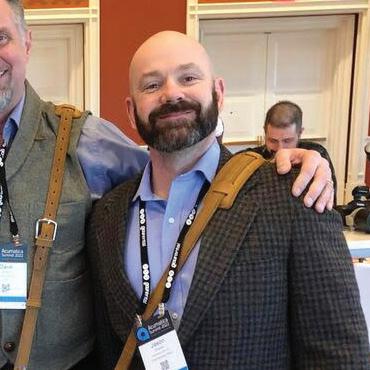
Cohort two introduced Britinee Rigsby to the right resources at exactly the right time. “I was ready to start my own business adventure. I was just ready to try my own thing,” she says. What started out as a small power-washing business turned into Nitro Mobile, a car detailing and ceramic coating expert service, focused in Mansfield, Arlington, Midlothian and the surrounding areas. “We would be out power washing and people would ask if we could detail their cars.” Rigsby and her boyfriend started researching the industry and were excited about the profitability and the actual service itself.
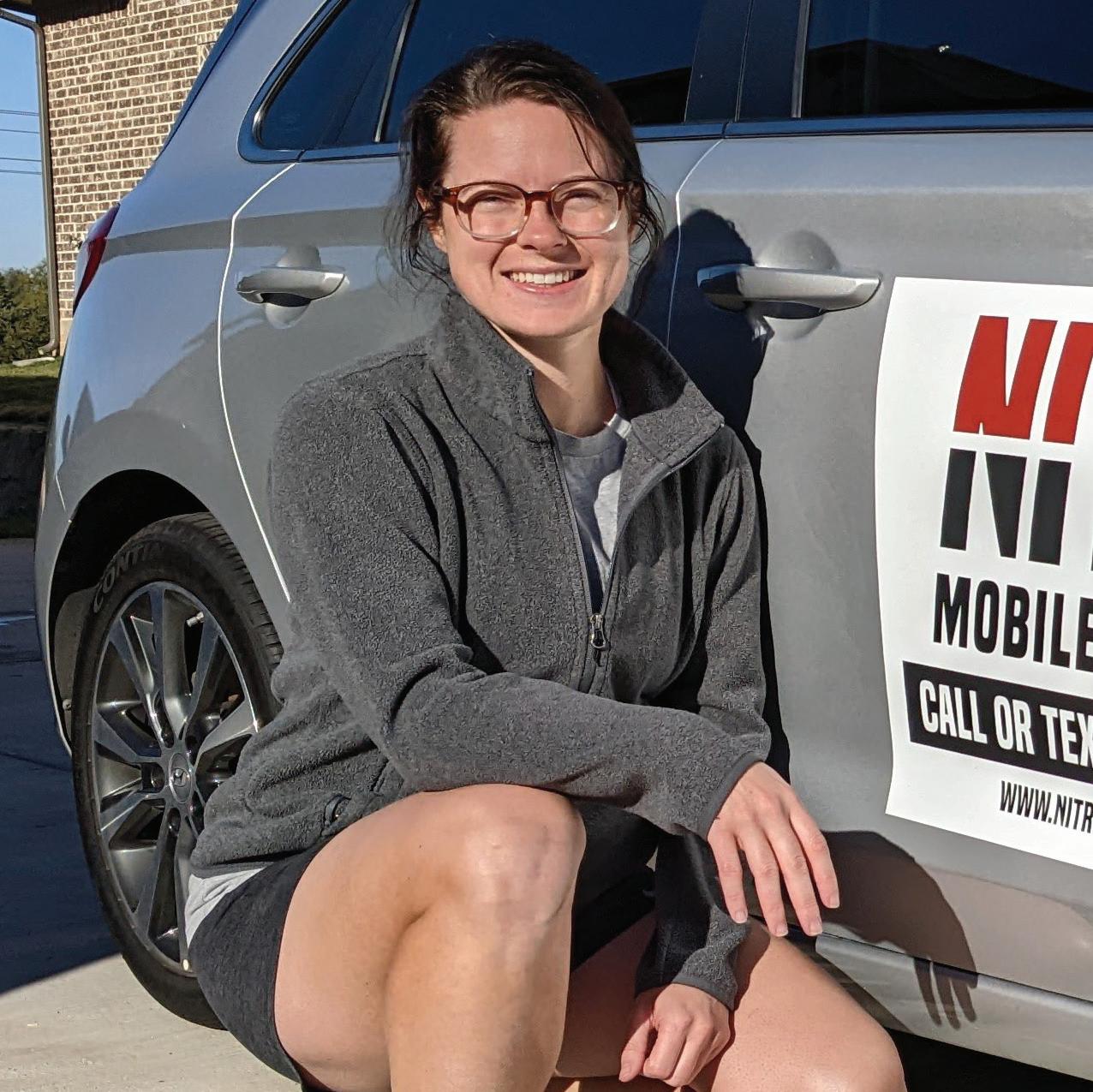
Rigsby, who was studying at Tarrant County College, had taken business courses with Ramboa and was eager to dive into the EEVF program once she applied and was accepted. “I knew if Lourdes was behind this academy, I was in great hands.” Rigsby was matched with mentor Tamara Payne, founder
and CEO of Ensemble Coworking (see full story on page 54). “She changed my thinking on my business future, how to do financials, how to do bookkeeping, my marketing, basically my entire business plan.”
Rigsby also credits the time management she developed in the program as a game changer in igniting her business to grow faster and reach further. “When you own a business, I didn’t realize how many different hats you wear. One minute, you are writing a marketing plan, then you are working with customers, and some days, you are the building janitor.” Over time, Rigsby has been able to achieve a balance of work and life through experience, engagement and encouragement. She advises other up-and-coming entrepreneurs to seek out programs like the EEVF and make time to prioritize their professional development and their business plan. Recently, Rigsby and her mentor picked up the book The Pumpkin Plan, by Mike
Michalowicz. The book introduces a simple strategy to grow a remarkable business in any field. Explains Rigsby, “I’ve learned about cutting the excess off of my business, anything that isn’t feeding my main goals. We are working to create an intentional service lineup of services that will sustain the future of our business.”
Jason Scoggins, a serial entrepreneur, founder and fractional chief operating officer of ATLATL Business Solutions, endorses the importance of programs like the EEVF as essential to longterm entrepreneurial sustainability, scalability and strategic growth.

“If you’re not progressing, you’re regressing,” Scoggins says. “Continuous improvement is a lifestyle. You have to keep learning and training to stay current and ahead of the game. I attend any and all trainings I can, I mentor people, I am mentored by people, I sit on boards, volunteer, and read at least one book per month.”
Scoggins, who has launched five businesses and sold three, is always looking at the data to help drive and guide his next move. “I plan to open a third business this summer. If you stick to metrics, then things work,” he says.
— Jason Scoggins
“If you’re not progressing, you’re regressing. Continuous improvement is a lifestyle. You have to keep learning and training to stay current and ahead of the game.”Britinee Rigsby
The EEVF program continues to provide its transformational results to Tarrant County entrepreneurs by supporting two cohorts annually. As the business owner and program alums confirm, participation can truly be a game changer.
“I can’t emphasize enough how much this program elevated my business from a concept to a thriving company,” Ambriz says. “I’m excited to see it grow. Take the chance and apply. You won’t regret it.” That advice is echoed by all her peers and serves as a call to action for future and current entrepreneurs looking to take the leap to greatness.
Leaders who promote emotional intelligence have workforces that are more prepared for the unexpected.
BY SHIKA HERSHEL PHDThe most sought-after, tried-and-true qual t es in ob cand dates have long ncluded po nts such as educat on, motivation, dependab l ty experience and confidence But there’s a new kid on the block. Recently an enlightened qual ty of emot ona ntelligence factors nto an employee’s abi ty to perform effectively as part of a professional team Among all the positive traits that effective leaders bring to the workplace, research has revealed an attr bute that is more reliable n pred cting overall success than our ntelligence quot ent, and that trait s emot onal intelligence The term was curated in the early 1980s, but Dan el Goleman popularized the concept in the late 1990s when he f ne-focused t into a workplace applicat on Emotional intelligence (EI) is def ned as the capacity to recogn ze and effectively manage emot ons in ourselves and others Skills involved n emot ona ntelligence are selfawareness, self-regulation, motivation, empathy and social skills Self-awareness is about understanding yourself knowing your strengths and weaknesses, drivers, values and the way you impact other people Self-regulation s the ab ity to red rect and control d sruptive mpulses and moods Mot vation s enjoying achievement for ts own sake A passion for the work you do, opt m sm and energy to improve are the key

elements of an emotionally intelligent and mot vated person Empathy is understanding other people’s emotional makeup and cons dering others’ feel ngs, especially when making decis ons F nally, hav ng socia skills is the ab ity to bu ld a relationship w th others to move them n desired d rections, such as be ng an influencer Cons der, for nstance, the mpact COVID-19 has not just on the physical cond t on but the mental state of m llions of Amer can employees There were quant fiable and l fealtering changes n their ves w th absolutely no preamble As people moved from off ces to remote work on a vast scale, interactions with colleagues were rad cally transformed The role of emotional ntelligence s v tal consider ng the changes employees are go ng through Some have even taken on the role of a homeschool teacher and full-t me homemaker wh le balanc ng a profess onal remote work ife Tamika Dew, d rector of sales and proposal operations at Tota Adm n strative Services Corporat on (TASC), says ba anc ng professional and home l fe is an emotional challenge “I do feel alienated working from home at t mes,” Dew says “Commun cation s acking w th my workplace because we have to all talk n a virtua setting but am a mom f rst and foremost I didn’t have a choice we had to adapt to the changes ”

One of the biggest problems companies face is lack of employee engagement due to working remotely and feeling disconnected from face-to-face nteract ons Simi arly, once they return to the off ce, there’s the trep dat on of worrying about be ng exposed to the COVID-19 variant When employees have sustained contact in the off ce, it’s easy for them to check n on one another and prov de emot ona support when necessary. But when nteractions are relegated to calls, emails and Zoom meetings, it’s much more d ff cult to recognize when people need assistance or simply to maintain healthy relationships Because of the lack of face-to-face interaction (and the hes tat on of face-to-face interact ons when people return to the workplace), emotiona ntelligence cues are taken from leadersh p
empathy.
Experts ike Dew and Mahdavi share s mi ar nterests n d vers ty and inclusion n the workforce, a key cog n the EI wheel Cultura shifts and technica challenges associated with the move toward remote work and then returning to the office—may seem daunting but as long as companies have emot ona intelligence awareness and train ng employees may find more ba ance and connectedness “Wh a t s needed n the wor k pl a ce i s more emp a thy and inclusion,” Mahdav says “We h ave to be m ndful a nd sympathetic of other people’s struggles, especially dur ng these unprecedented t mes







Who would have thought that simply going to work would be considered an act of bravery?
Unless you're a first responder, emergency health care worker or one of those drivers on the reality TV show Ice Road Truckers, your daily work responsibilities probably don’t require much courage or daring to complete.
Just three years ago, however, that wasn't the case. The world was in the throes of a global pandemic. Everything had shut down. Companies had closed their doors. People were afraid to go out in public without plenty of face masks and hand sanitizer at the ready.
But in addition to first responders and health care professionals, bus drivers, grocery store employees, and construction and other skilled trade laborers also didn't have the option to shut down. They had to brave the unknown of the COVID-19 threat and go about their duties while putting their health and safety second to that of humanity.
They had to go to work. The rest of us? We stayed home. What's more, we got used to it.

While the COVID-19 pandemic didn’t establish the ground rules for remote and hybrid work, it certainly drew attention to them, for employers and employees alike. These days, according to OfficeRnD, nearly 75% of all U.S. employers are using, or plan to implement, a hybrid work model in which employees are permitted to fulfill their responsibilities through a combination of on-site and remote work.
That’s not solely by choice. It’s also been a response to the way the workplace has changed because of the pandemic. When shutdowns were in effect, not only were people forced to work from home, but many of them discovered they preferred it—and could accomplish as much as they could by going to an office.
It’s no wonder, then, that 60% of respondents to a 2023 Gallup survey said they favored a hybrid model, and another 33% said they preferred fully remote work. In other words, one-third of American workers feel no desire or need to “go to work” in the conventional sense. They’d rather stay home and do their work from there.
Nevertheless, the pendulum has been slowly swinging since 2020, back to the side of companies opening their doors—and employees having to walk back through them and report to work.
According to Chris Powers, director of talent acquisition operations for Frontier Communications in D/FW, companies are expecting employees to return to the workplace in greater numbers today than they did in 2020 and 2021—for part of the workweek, at least.
"Since the end of the pandemic, we've been seeing a shift across many industries of people returning to the office,” Powers says. “Maybe not five days a week, but in many cases three or four days a week. It’s a gradual push toward pre-COVID normalcy."

“The first key is setting clear expectations for both groups so they know what to anticipate. You have to bring everybody together and communicate with them clearly so they feel like they’re one team, one unit.”
Russell O'Quinn TRANSPORTATION INDUSTRY EXECUTIVE
As employees have been making the move back to the office, they’ve confronted another new reality: The definition of “team” has changed.
Throughout most of the 20th century, the labor landscape in America looked pretty much the same. Businesses opened in factories, office buildings or storefronts, then hung out a "help wanted" sign and waited for people to line up for the chance to work a 40-hour week under the watchful eye of management. Management was top-down and top-heavy. Most employees punched a time clock and were paid by the hour. A lucky few enjoyed the freedom and perks of being salaried.
As a new century dawned, however, advances in technology, communication and transportation helped expand a previously small sector of the labor pool: contract workers, also known as freelancers or gig workers.
How much has that segment grown? In a global survey conducted by international business consulting firm Deloitte of more than 10,000 executives, only 42% of the organizations represented were made up primarily of salaried employees. That was in 2018, before the COVID pandemic, and the majority of respondents expected that number to increase in the years that followed.
Increase it did. As businesses closed during the pandemic, monthly revenues earned by freelancers in the U.S. (the world’s largest market for freelance work) jumped 11% between April and May 2020, and another 18% the following month.
The numbers have only grown since. Zippia, an online recruiting and career resource center, reported that more than 70 million Americans performed freelance work in 2022, contributing more than $1.3 trillion to the U.S. economy. That work is done across a wide range of industries. According to the U.S. Bureau of Labor Statistics, the most common of those are transportation,
communications and media, construction, information technology and art and design.
Put together, these trends raise an interesting question: With staffing models changing to include more contract workers to go along with full-time personnel, how can businesses make sure both groups are productive, engaged and working together for the benefit of the company? Moreover, what’s to keep the gig workers from making the salaried workers obsolete?
According to Charlie Saffro, founder and CEO of Chicagobased CS Recruiting, a staffing firm serving the supply chain and logistics industry, a company’s focus needs to be on employee engagement and satisfaction, whether they’re on the payroll or a contract arrangement.
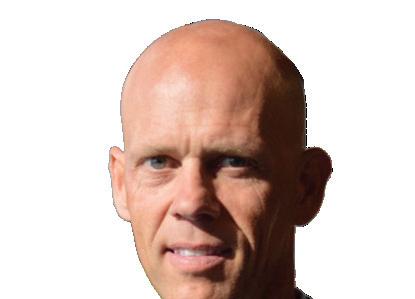
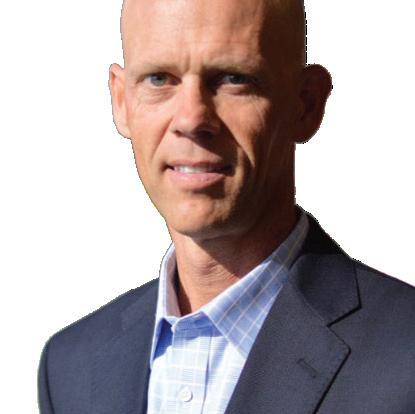
“People are the main asset in any company,” she says, “and it’s clear that when you have employees who are engaged and feel a connection to the company and their team, they’re going to be more productive. As a leader, you have to work hard to instill that connection and make them feel the purpose of their job: The return is that employees are showing up every day and giving back to their company because they feel connected to it.”
Blending full-time employees with contract workers and keeping everyone on the same page can be a challenge, but businesses have little choice in the matter. Research from Harvard Business School indicates that 90% of companies are moving toward a combination of full-time and freelance workers.
“There are definitely jobs that make sense for freelancers, and there’s a time and place for contract or gig work,” Saffro says. “But the truth is, it’s only a matter of time before they leave the organization, and then you must build a new relationship with whoever comes in next.”
“Since the end of the pandemic, we’ve been seeing a shift across many industries of people returning to the office. Maybe not five days a week, but in many cases three or four days a week. It’s a gradual push toward pre-COVID normalcy.”
In addition to outsourcing work to contract employees, many businesses utilize crowdsourcing to locate talent. Growing in popularity over the past decade, crowdsourcing is the process of choosing from a large group of candidates who submit their information via the internet, social media or smartphone apps. Although crowdsourced workers aren’t always integrated with a company’s on-site teams, the practice offers several advantages for businesses looking for short- and long-term work solutions. According to the Society for Human Resource Management, these include cost savings, speed of hiring and the ability to locate people with skills an in-house team may not have.
Upwork, Fiverr, Toptal and Flexjobs are examples of the most commonly used crowdsourcing platforms.
The challenge is to not lose that connection and sense of purpose with contract employees—the kind that typically exists with full-time personnel. Of course, freelancers present some clear advantages. For one thing, contract workers are often highly skilled and require little training, which means they onboard quickly and hit the ground running. In addition, while their pay rates may be higher in some cases, they don’t have the typical overhead expenses that full-time employees do, such as paid time off or employer contributions to retirement accounts or insurance premiums. With a contract employee, what you see is what you pay for.
For Powers, that’s a big advantage. He says being able to hire specific talent on a contingency basis enables an employer to address specific needs quickly and efficiently. “I can get someone right away for the role I need to fill, and I don’t have to spend training time or dollars on them,” he says. “I can be precise about obtaining talent without having to train an embedded, full-time employee to grow into that role.”
Bringing contract workers on board is one thing. Making sure they fit together and work effectively with full-time, salaried employees is another.
Unlike staff, you can’t outsource culture, according to Jeremie Kubicek and Steve Cockram, authors of The 100x Leader: How to Become Someone Worth Following
Kubicek and Cockram are co-founders of GiANT Worldwide, a global media company specializing in leader transformation. “Culture is the way that people are onboarded and the development that goes in to growing people,” they write, adding that it is reinforced by values, relationships and consistency of communication.
Is it possible to reinforce a culture with a blend of salaried

and contract employees? Are there things a company can do to make sure contract personnel are made to feel welcome and given the tools they need to succeed?
A recent report in the Harvard Business Review highlighted the fact that full-time employees and contractors have different motivations, expectations and backgrounds, and that understanding those differences can go a long way toward helping the two groups work harmoniously. Moreover, understanding the differences will help retain the full-time employees so they don’t feel a fear of being replaced by contractors.
In addition to not knowing their new colleagues, contract employees are in the dark about organizational context and goals, “and may even have different conceptions of what the project is supposed to accomplish and why,” the report says.
Russell O’Quinn, a Knoxville, Tennessee-based transportation industry executive, offers three important tips for successfully blending full-time and contract personnel.

“The first key is setting clear expectations for both groups so they know what to anticipate,” he says. “You have to bring everybody together and communicate with them clearly so they feel like they’re one team, one unit.
“Second, it’s advisable to cross-train between salaried and contract employees whenever possible, so they not only work well together but can cover for one another in case of absence or departure.”
The final key, O’Quinn says, is to follow up regularly to make sure the job responsibilities and level of performance of each group match the expectations that were set for them.
“As long as people know what’s expected of them and are happy in their roles, they won’t worry about who is full time and who’s on contract,” O’Quinn says. “They’ll be focused on working together and getting the job done, and that’s a prescription for success.”
“People are the main asset in any company and it’s clear that when you have employees who are engaged and feel a connection to the company and their team, they’re going to be more productive.”






















































































































































The Tarrant Small Business Development Center is a must-visit for small business owners. by shika hershel, phd












Atthe heart of the United States’ economic landscape, small businesses have firmly entrenched themselves as a potent force, employing almost half of the country’s workforce and contributing around 45% of the GDP. This information from the U.S. Small Business Administration (SBA) highlights the sector’s pivotal role in propelling the nation’s economy and bolstering local communities.
However, embarking on the entrepreneurial journey of starting and running a small business can often prove challenging, particularly for those who find themselves short of the necessary resources and expertise. The Small Business Development Center, also known as the SBDC, is an organization that has a significant impact on small businesses across the nation. The SBDC is administered by the U.S. SBA in collaboration with private organizations, educational institutions and government entities. Its goal is to assist small business owners by offering
management guidance and support, both to those currently in business and to aspiring entrepreneurs. These partnerships allow SBDCs to offer a broad range of services, including training, counseling and technical assistance.
SBDCs operate across every state and territory, offering a network of over 900 service locations. Each center develops services that promote coordination with other available resources, ensuring statewide outreach and optimal support for small business growth.
These services range from providing businesses with access to capital, marketing strategies and business training to helping businesses navigate complex government regulations and policies. “We’re working to collaborate where we can bring successes to new startup companies and help the ones that need support that are not financially able to help themselves,” says Rex Steele, director of the Tarrant SBDC.

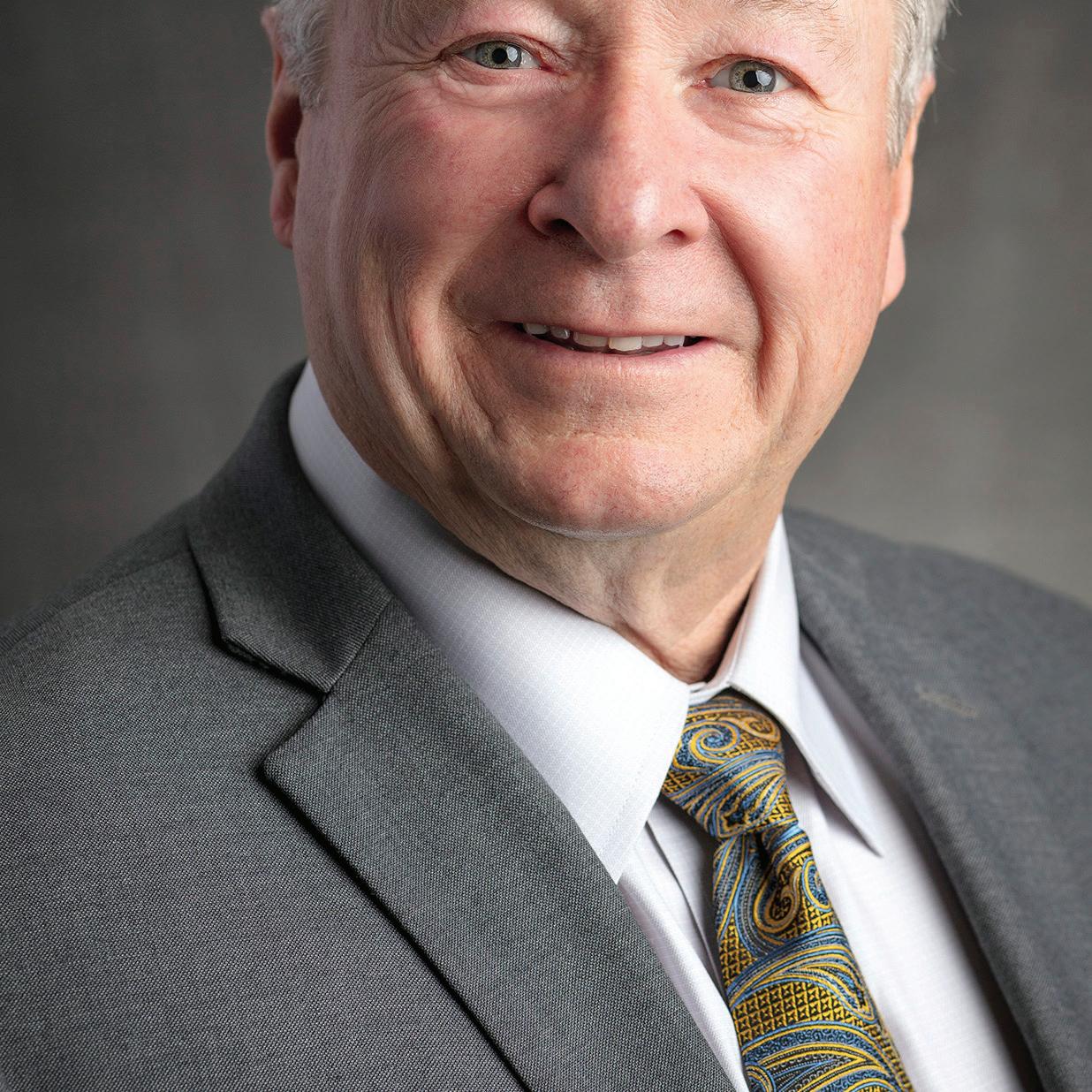
Capital is the lifeblood of any business, and its accessibility is often a deciding factor in the success or failure of small businesses. The Tarrant SBDC, guided by its results-oriented approach, offers various financing options for startups. This includes preparing the applicant to apply for loans, grants and loan guarantees, all aimed at facilitating the start or expansion of small businesses. The SBDC bridges the gap between businesses and financial institutions, leading to fruitful partnerships that drive growth. Furthermore, the SBDC supports businesses as they prepare for investment pitches and ensures they are wellversed in investor expectations—a key attribute of their factdriven management philosophy. The organization also facilitates networking with banks and other financial institutions, which can often lead to partnerships and collaborations that help support small business growth.
“Entrepreneurs have a special spirit,” Steele says. “They recognize other entrepreneurs real easily because they’re willing to take the risk. There’s a lot of hours and work involved; there is a huge reward when you can make it successful and it’s yours.”
The Tarrant SBDC’s commitment to continuous improvement through shared learning is evident in its multifaceted offering of problem-solving assistance. This support helps small businesses access capital, introduce and exchange new technologies, enhance business planning, strategy, operations, financial management, personnel administration, marketing, export assistance and sales. These areas are crucial for a business’ growth and productivity enhancements.

“While they’re growing their business, we work with small business owners continuously every three to six months to find out how they stand and where they are financially.” — Rex Steele

“We look at their ratios; we look at their statements and their balance sheets to find out where they are strong and where they are weak.”
— Rex Steele
Counseling stands as one of the SBDC’s key services, offering one-on-one sessions that reflect the organization’s commitment to open, honest communication and member participation. The counseling services help business owners diagnose the challenges facing their businesses and are tailored to the specific needs of the business. The SBDC adviser provides a road map and guidance on how to overcome the challenges they currently face and those they will face in the future. The business counseling service is instrumental in helping small businesses grow and thrive, and their impact on the economy is significant.
“While they’re growing their business, we work with small business owners continuously every three to six months to find out how they stand and where they are financially,” Steele says. “We look at their ratios; we look at their statements and their balance sheets to find out where they are strong and where they are weak.”
Fundamentally, Steele and the Tarrant SBDC are looking to help small businesses answer questions like: How can we help eliminate costs? How can we help bring in more revenue? “We measure along the way on where they are at each point,” Steele says.
In an era where resources are often stretched thin, the SBDC has stepped in to fill a crucial gap by providing technical assistance. Small businesses often lack the resources to hire professional consultants to help with specific business issues. The Tarrant SBDC fills this gap by offering technical assistance in areas such as accounting, marketing and legal issues. The technical assistance is offered by seasoned professionals in the respective fields, ensuring that small businesses get the best advice and support to thrive.
Having a solid marketing strategy is a critical component that a small business needs. The SBDC offers robust marketing training programs, which help small businesses understand the
fundamentals of marketing and develop effective marketing plans. For instance, the organization provides educational services that focus on developing targeted marketing initiatives designed to reach a specific audience and boost the bottom line. Additionally, SBDCs offer access to marketing metrics and analytics, enabling businesses to track their progress and identify areas for improvement.
The complexity of securing government contracts can often be a daunting process for small businesses. SBDC advisers, with their commitment to customer-driven quality and service, guide businesses through this maze, helping them secure these lucrative contracts that can offer a steady income stream.
In addition to these services, the SBDC provides businesses with legal, tax and compliance counseling. The organization takes pride in its ability to help small businesses navigate complex government regulations and policies effectively. This is especially relevant to companies that are in highly specialized industries, or industries with heavy government regulation. By providing legal and tax advice, the SBDC ensures small businesses fully understand the policies affecting them and are compliant.
The Tarrant SBDC also has a wealth of business resources. For example, they offer easily accessible information about business licenses and permits, providing guidance on how to navigate the various processes. Additionally, the organization schedules free business strategy consultations that enable business owners to seek guidance on specific aspects of their businesses, which is ideal to help small businesses thrive in today’s highly competitive marketplace.
For more information, visit tarrantsbdc.org.
All SBDCs have a connection with a college or university, and they work together in different aspects. Tarrant County College and the Tarrant SBDC have a wonderful working relationship, starting with the Devoid Jennings Business Assistance Center, housed on TCC’s campus, which connects small businesses with the following collaborative partners.
As a nonprofit organization, Score Fort Worth is dedicated to empowering entrepreneurs in the North Texas region by providing expert business mentoring and coaching services, free of charge.

PeopleFund serves the needs of small business owners by providing financial assistance and education to individuals who otherwise lack access to these resources. Offering loans up to $350,000 with favorable repayment terms including no prepayment penalties, PeopleFund takes pride in underwriting its loans flexibly while providing additional benefits for veterans.
Alliance Lending Corporation (ALC) offers stable and affordable financing solutions to Texas-based for-profit, owner-occupied businesses. Their expertise lies in commercial real estate financing, with loan limits ranging from $250,000 up to $5.5 million.
William Mann Jr. CDC provides loans to small, minority- and women-owned businesses for a variety of purposes, including equipment purchases, facility improvements, permanent working capital and business acquisition.
The Fort Worth Metropolitan Black Chamber of Commerce is a highly respected business advocacy organization that places a strong emphasis on economics and education. Its core mission is to provide valuable support and advocacy for minority business owners. This proactive group also collaborates with the City of Fort Worth staff for the purposes of advancing economic development initiatives that benefit the entire community.

Southeast Fort Worth, Inc., plays a vital role in the city's economic development by facilitating affordable housing, small business development, neighborhood revitalization and financial education. The organization is dedicated to harnessing the potential of the city's assets to foster growth, generate employment and enhance the quality of life in Southeast Fort Worth.
The Regional Hispanic Contractor Association is dedicated to fostering the growth and prosperity of Hispanic contractors in Texas. The association works diligently to establish initiatives and provide resources aimed at empowering these contractors to achieve their full potential.
Sparkyard fosters a thriving entrepreneurial community in Fort Worth by providing a comprehensive platform that connects business owners and entrepreneurs to the necessary resources for scaling their businesses. With the goal of making Fort Worth a nationally renowned hub for idea cultivation and company success, Sparkyard is committed to facilitating a connected and vibrant ecosystem for entrepreneurs in the area.
Texas A&M School of Law has collaborated with the BAC to introduce an Entrepreneurship Law Clinic. This clinic has been designed to provide assistance to clients with limited financial resources who aim to initiate, manage and expand their business ventures.
TECH Fort Worth plays a critical role in promoting the growth of the technology business community. It facilitates the commercialization of innovative technology by helping regional entrepreneurs. The organization identifies startups and entrepreneurs with technologies that have high market potential, and leverages community resources to help these passionate individuals achieve success.
Accelerate DFW Foundation, established in 1999, is a nonprofit organization committed to stimulating economic growth in Fort Worth through impactful programs and services. The foundation's primary objective is to support local entrepreneurs and promote the significance of entrepreneurship within the community.
In the post-pandemic workforce—a workforce that has already seen fundamental changes from the top down with no plans for turning back—compassion meets innovation in web-based strategies creator CauseLabs. Led by CEO Sheryle Gillihan, CauseLabs is an exemplar of the next generation of creative services companies strategizing the future of work.
“The pandemic changed the way people work,” Gillihan says. “Remote work was something many communities desired preCOVID-19, but ultimately, the lockdowns forced many employers considering it to learn how to do it for themselves and establish best practices moving forward. Consequently, we are very busy helping organizations adapt to these new practices.”
A public benefit corporation, CauseLabs has done “work that matters” since its founding in 2018. CauseLabs helps companies adjust to the demands of a post-pandemic e-workforce. A recent study published by Deloitte found that the workforce is more varied than ever, with full-time and part-time employees working alongside freelance, gig and crowdsourced workers from a variety of settings and locations (see story on page 30).
As a public benefit corporation (which, according to Cornell University School of Law, is a company created to generate social and public good, and to operate in a responsible and sustainable manner), CauseLabs attracts nonprofits and other PBCs. It does not, however, limit itself to that arena and services many organization types with its expertise.
“A shift is coming, if it is not already here,” Gillihan says. “There is a desire by many workers to work in the gig economy but to also have some security and ability to make this lifestyle choice easier. Things like
by jeffrey ranta, phdvirtual work, flex time, four-day workweeks and the ability to balance individual demands on time alongside what an employer requires are all contributing to this shift.”
As a result, CauseLabs’ web services and training advocate for strategies and tactics for the new normal in the workforce. Gillihan says technology is a powerful tool not only for growing businesses but for providing opportunity and education to the next generation of leaders. CauseLabs helps develop and expand those opportunities.
But, Gillihan warns, accommodating virtual work does not come without a cost. Workers who spend more time working from home than in the office lose the socialization component of corporate culture. Tellingly, working from home can foster isolation and difficulty accounting for effective time management.

CauseLabs is a web agency that specializes in strategy, web design and development, and other web services for growing businesses, nonprofits and social impact companies. Some of CauseLabs’ clients have included LEGO, The United Way, the World Economic Forum, the Dave Thomas Foundation for Adoption, and Village Capital. CauseLabs has been featured in Forbes, Wired and Mashable. Sheryle Gillihan’s company has been widely recognized as a leading woman-owned business in the business-to-business technology sector. More information about CauseLabs can be found at causelabs.com.
“I did not get the kind of connection you do with a colleague down the hall,” she says, describing her experience working from home. “When the pandemic forced companies to suddenly adopt virtual work without preparation, a lot of what we discovered was the virtual work environment was not always productive or as sustainable as past in-person strategies. There was a lack of dedicated [home] office spaces, the added strain of kids home from school, partners or roommates taking virtual meetings at the same time in small spaces and a lack of digital tools for success.
“That is where CauseLabs brings value—helping to strategize and implement e-workforce changes while maintaining productivity.”
To meet this need for smooth transitions to a manageable,
productive virtual workforce, CauseLabs helps organizations adjust—removing analysis paralysis—and helping usher in change. CauseLabs’ custom solutions are developed to establish a sustainable digital presence for their organizations.
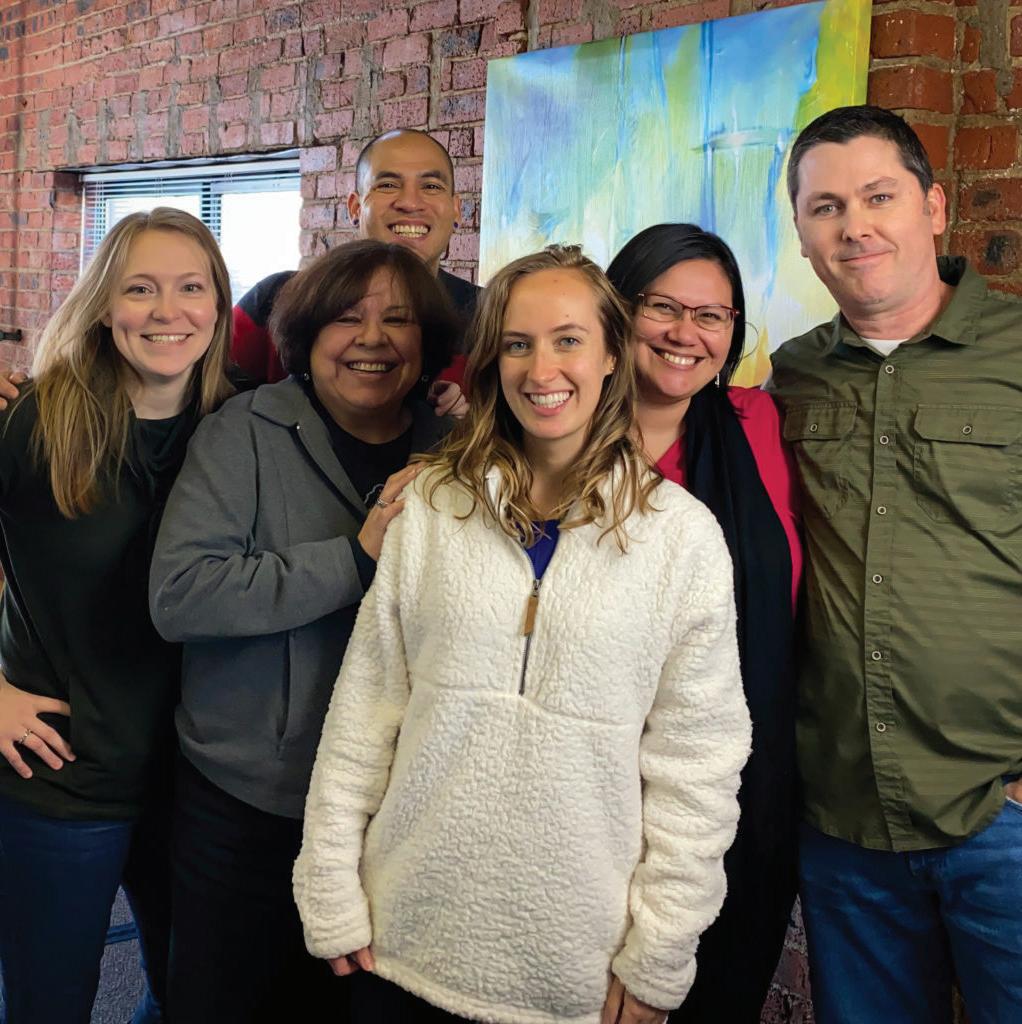
But living these values and implementing change are not always complex. As an example, to maintain community in their organization, CauseLabs hosts a daily team huddle with the entire staff at 10 a.m. The meetings are a critical part of the daily routine. Sometimes the huddle offers updates or check-ins, or there may be training, a fun question or a game. According to Gillihan, the huddle builds team morale and a sense of purpose—something she learned while serving in the Army with her husband and company co-owner, Michael.
The company is also a transformational example of handling other personnel issues like health care. During the pandemic, CauseLabs paid health care premiums for every employee and their family members. They still do.
“It was something Michael and I both wanted for our employees,” Gillihan says. “We had it in the military and it made everything easier knowing when we were on mission, things were OK back home.”
In other activities, Gillihan hosts a podcast called Woman Owned Agency, featuring interviews with female entrepreneurs and their respective journeys. Updated monthly, it is available on Spotify, Stitcher, Apple Podcasts, Google Play, Pandora and elsewhere. Gillihan has also written a book, The World We Know, which “offers readers a thought-provoking exploration of empathy, compassion and the power of diverse perspectives.”
When describing all of her successes, Gillihan is deferential, saying she balances her leadership with humility and confidence. “With every promotion I didn’t feel qualified, but my service life taught me to be confident and that I can handle it.”
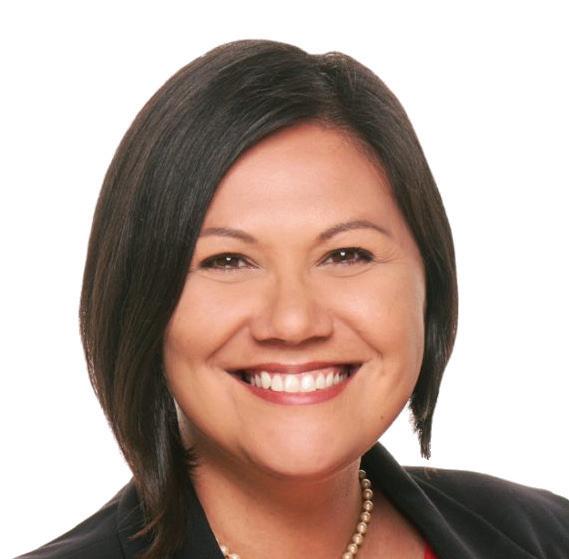
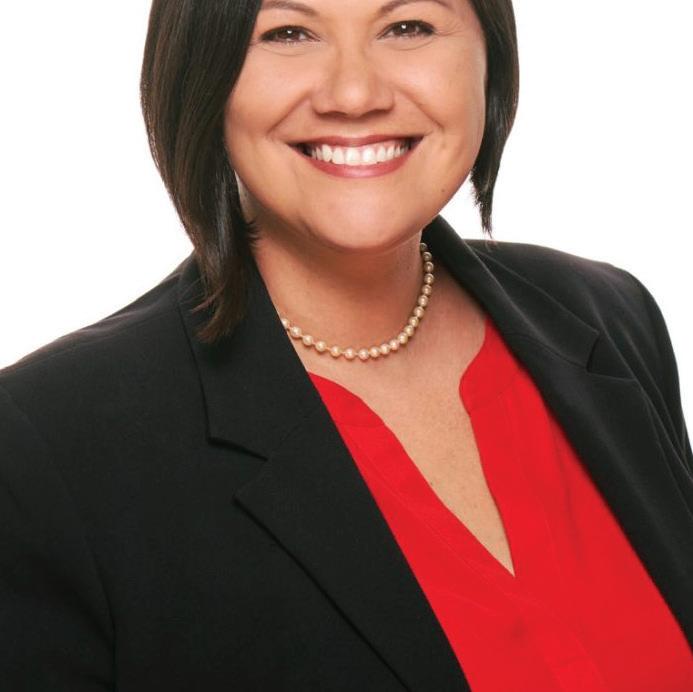
“There is a desire by many workers to work in the gig economy but to also have some security and ability to make this lifestyle choice easier.”
— Sheryle Gillihan CEO, CAUSELABSThe CauseLabs team at HQ
Tarrant Small Business Development Center (SBDC) provides management and technical assistance to local small businesses and aspiring entrepreneurs throughout Tarrant County The consulting services provided are at no cost and training services are at a nominal fee




Business consulting services are customized, one on one face-to-face or virtual at no cost Consulting services provided are business plan development, capital acquisition, marketing, regulatory compliance and more. The Tarrant SBDC provides services to a diverse population, including special emphasis groups; women, minorities and veterans who are seeking to start or grow their business.
Accounting & Bookkeeping
Business Planning
Cash Flow Models
COVID-19 Support
Disaster Services
Financial Planning
Government Contracting
Legal Structures
Licensing & Permits
Market Research
Startup Cost
Target Marketing
Special arrangements for the disabled will be made when requested in advance Advising services are offered by the Tarrant Small Business Development center without regard to race, color, age, national origin, religion, sex or disability. Special provisions will be made for limited-English speaking individuals.
The Tarrant SBDC is hosted by Tarrant County College and is one of twelve field centers of the North Texas SBDC Network Funded in part through a cooperative agreement with the U S Small Business Administration (SBA) SBA’s funding is not an endorsement of any products, opinions or services.
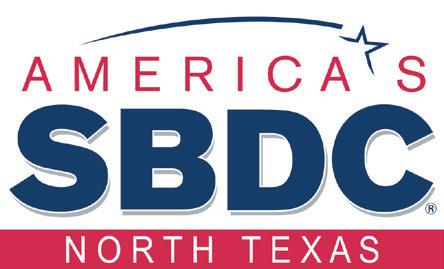
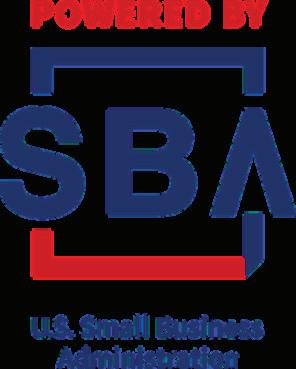

For accommodations, please contact the Tarrant SBDC at 817-515-2600
www tarrantsbdc org
Transforming Tarrant County’s economy through enterprise is no small task, but TechFW and others are up to the challenge.























































 by ian fitzpatrick, esq
by ian fitzpatrick, esq





























When Hayden Blackburn describes Fort Worth in the mid-1980s and early ‘90s, he recalls city leaders talking about the need for a more resilient and diverse economic ecosystem. Heavily dependent on aerospace, oil and the cattle trade, Fort Worth had lost thousands of jobs and needed a new strategy for rebuilding the local economy. Blackburn, who presides over TechFW, the nonprofit business incubator that promotes homegrown entrepreneurs, is betting that local startup companies can supercharge the growth and diversification of Fort Worth’s economy.
“The people that came together honed in on bio and medical technologies as a core opportunity,” recalls Blackburn, who has been TechFW’s executive director since 2018. In a span of five years (from 2016 to 2021), five biotech and health care startups with ties to the city and TechFW were acquired, a testament to what Blackburn describes as rich opportunities to plant seeds early in industries to build up clusters.
“When there’s a rich ecosystem available for those launching high-growth technology companies that they can identify and get connected to the resources to help them along every step of the journey—whether that be the coaches, the mentors, the advisers, the investors—there’s somebody at the ready to help guide them and inform them,” Blackburn says.

One such success story that TechFW mentored is Eosera. Cofounded by Elyse Dickerson, Eosera is a privately-held ear care
company launched in 2015, whose products are now carried by Walmart and CVS nationwide. After a 13-year corporate career with Alcon, the worldwide leader in eye care founded in Fort Worth in 1945, Dickerson decided to go entrepreneurial, along with fellow co-founder Joe Griffin.
“We were just two entrepreneurs with a dream and not much else,” recalls Dickerson. TechFW was able to help them look at their business concept and business model and help pressuretest them with a lot of different voices in the room.
“So it wasn’t just two entrepreneurs: They brought in a lot of experts to help us,” she says. TechFW connected Eosera to advisers and mentors, and they helped lease wet-lab space and consulting scientists from the University of North Texas Health Science Center, which helped the fledgling startup formulate some of its earliest products. With nearly 40 employees making and distributing nationally sold ear care products, Eosera points to how TechFW is helping to transform Fort Worth into a life and biosciences cluster, which is a boon for the local economy.
Now that Eosera is one of TechFW’s success stories, Dickerson helps garner more support for TechFW in the local community. “We’ve proven it works,” she says. “TechFW can print a list of all the successful companies that have come out of that program, and now it’s time to grow it. We can only grow it if we have financial support. So, my passion is to get other business leaders donating their dollars to this great proven institution.”
One of those key advisers to Eosera was Darlene Boudreaux. A CPA by training with experience in pharmaceuticals and medical devices, Boudreaux not only preceded Blackburn as TechFW’s executive director, but she also served as Eosera’s CFO because of the relationship she built with Dickerson during her time in the TechFW program. Boudreaux’s unique experiences gave her a multitude of perspectives she could leverage not only to help TechFW, but Tarrant County’s entrepreneurs. The county, she says, has come a long way from the struggling economic days of the 1980s and ’90s.
“There were no venture capitalists here,” Boudreaux says. “There were no angel networks. There wasn’t anybody to connect with. Some of these wealthy individuals or family offices, they’d call me and say, ‘Don’t you have any great companies for us
— Hayden Blackburn EXECUTIVE DIRECTOR, TECHFW

to invest in?’ And I’d have entrepreneurs, some of our clients who would say to me, ‘Don’t you know any wealthy people I can go talk to?’”
Around 2009, Boudreaux identified a need for angel investors outside of the structure of TechFW. She founded the North Texas Angel Network, which in the beginning primarily served Dallas entrepreneurs. By 2012, feeling a need to help budding entrepreneurs in Fort Worth, she founded what became Cowtown Angels, an homage to Fort Worth’s cattle ranching roots. Tapping into a network of individuals and families, Boudreaux set out to find investors interested in the life sciences and technology. While the portfolio of companies has gone beyond Fort Worth to include companies in other cities, Cowtown Angels, like TechFW, represents the evolving ecosystem of supportive entrepreneurs; there is now a cluster of committed individuals with deep roots in Tarrant County who are laser-focused on welcoming entrepreneurs and diversifying the economy.
Melissa Acosta, executive director of research and innovation at JPS Health in Fort Worth, has been a TechFW board member since 2020. “I was drawn to TechFW because the premise of the organization is me at my core—a connector,” says Acosta. “TechFW works with entrepreneurs at all stages of development and plays a vital role in mentoring and coaching entrepreneurs, but most importantly connecting the entrepreneurs to needed community resources.” To wit, once an entrepreneur/company is part of TechFW, they are part of the family until they are ready to leave the nest.
To learn more about TechFW and their startup programs, visit techfortworth.org.

“The big thing that I would say is pay attention. There are so many exciting stories of new innovations that are popping up; they’re in our own backyard and they’re building some things that are changing the world. There’s a lot of joy across this region that these companies are growing, scaling and creating new solutions here.”

We have many ways to partner with your organization:

Volunteer Engagement
Employee Giving
Matching Gifts
Naming Opportunities
Philanthropic Investment
Sponsorships and so much more…

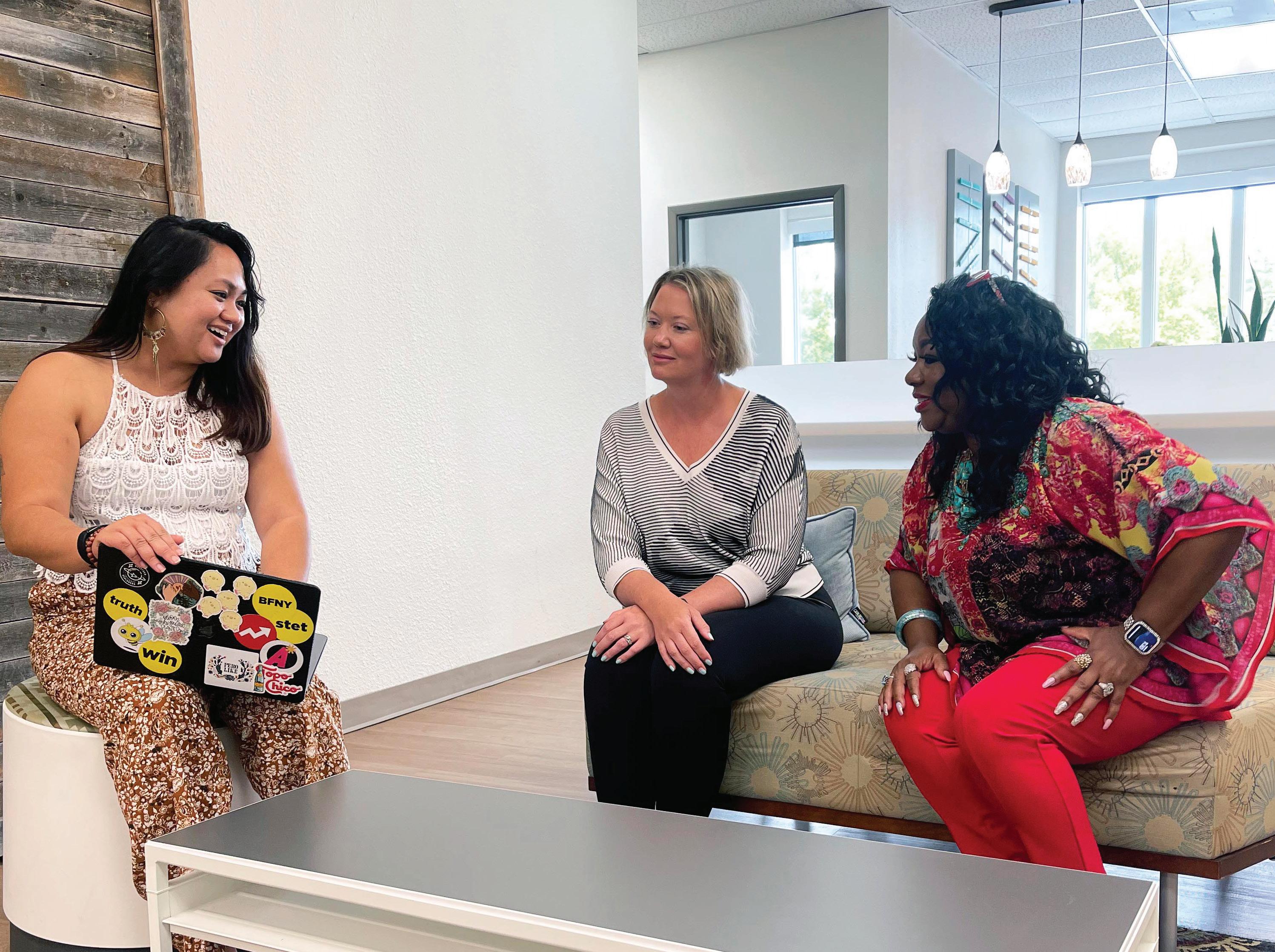
Tamara Payne has lived and worked in Tarrant County for nearly 30 years. Over this period, she has developed twin passions: community service and aiding people with career advice. While she was coming up in the business world, she routinely volunteered and helped others in whatever capacity available. Then, in 2016, Payne co-founded her second business as an entrepreneur: Ensemble Coworking in Fort Worth. Ensemble is a coworking space that was created for entrepreneurs to come together to share, collaborate and learn from like-minded business people. Through this endeavor, Payne continues to serve others by giving them what she never had early in her entrepreneurial journey: community.
What’s the driving force behind opening a coworking space?
This is a place where I can have my own business but can still be connected to other people. I can have mentorship through
by shelbi ankiewicza peer, where I was not getting that as an entrepreneur. So I thought if I could create a space where that could happen in Fort Worth, then I would be giving back to my community and giving back to aspiring entrepreneurs to help them grow their businesses quicker and with less mistakes than I made starting out.
So the real foundation for starting Ensemble was to give a place for solopreneurs and small businesses and their teams to come together and connect with one another in a workspace that is inspiring and productive. It’s not just for the times we need to learn how to do something differently or work through a challenge, but it’s also about those exciting moments we need someone to share it with.
Have you seen the vision for your business come to life?
Oh, absolutely. We’ve had a lot of businesses who have come in as newbie businesses, less than a year old, that have grown
out of the space—like literally grown into having teams that were big enough they couldn’t be here anymore. They went and got their own spaces, and they’ve grown their businesses. Then we have others who maybe will never be beyond one or two employees and they’ve stayed here to connect and work with one another.
Tell me about the Everyday Entrepreneur Venture Fund committee (EEVF) at Tarrant County College. What is it and what role do you play?
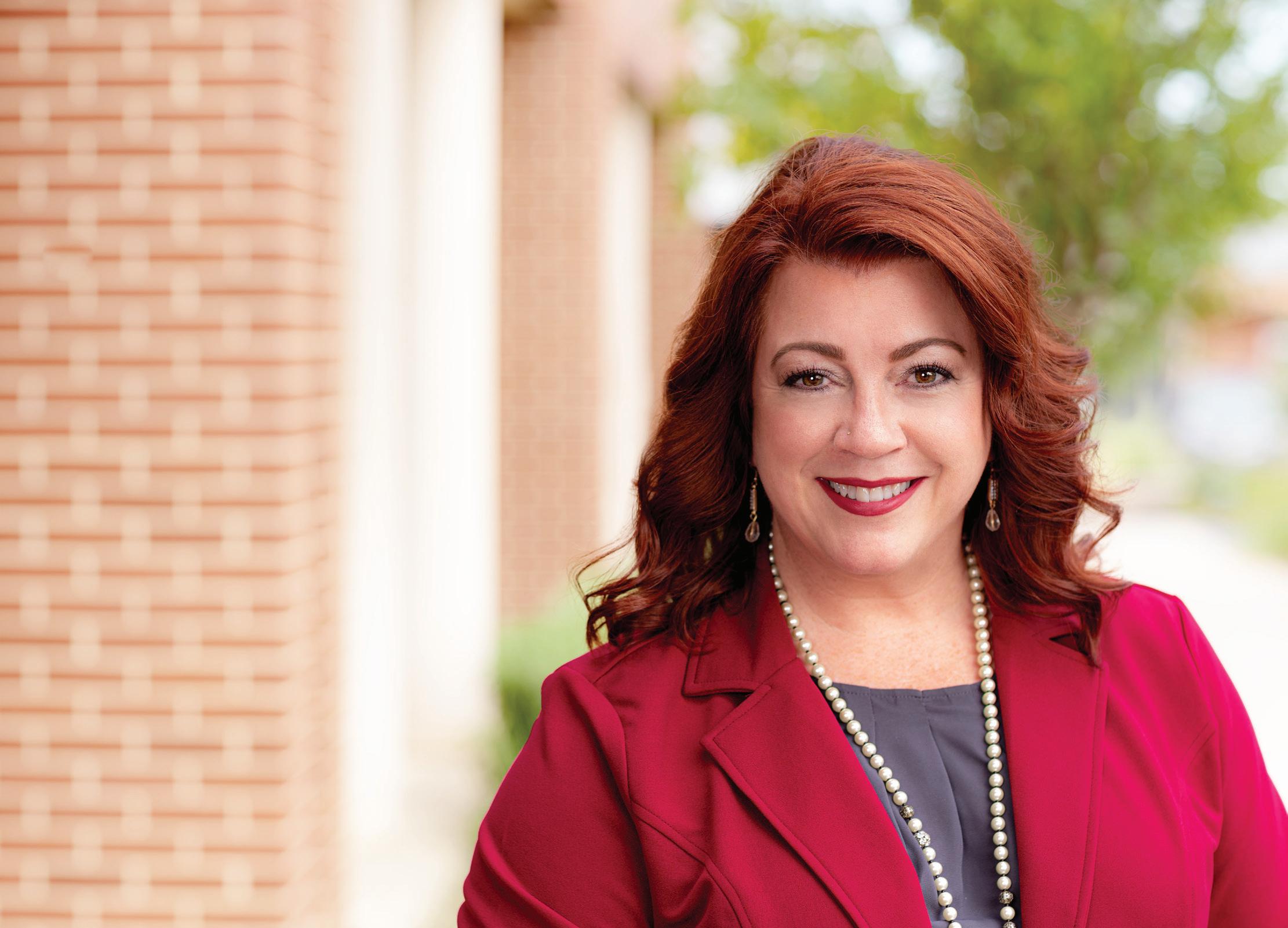
This was brought to us because we’re the Advisory Committee for TCC and they said it’s a great opportunity to give back. You do not have to be a Tarrant County College student. You just have to be an entrepreneur with a business in Tarrant County that’s under three years old with no more than $500,000 in total revenue (see “Inspiring Ingenuity” on page 14). One of the number-one things we find as a challenge in the Fort Worth area is lack of money for early stage and startup entrepreneurs. And so to get any type of funding for an early stage startup is tremendous.
During my first year, I judged the applications and the submissions, and it was a very wonderful process to be a part of. However, during the second year, I was teaching so I could not be a judge since some of my students were applying. Instead, I was asked to be a mentor to the one who got the most awarded money, and I’ve been mentoring her since July of 2022. She and
her boyfriend started a mobile auto-detailing company, and it has been an absolute joy (see “Love it When a Thing Comes Together” on page 21).
How many candidates are usually accepted for the program each year, and does it change?
I believe there were five last year and I believe there’s going to be five this year. I know they’ve already picked the winners for this year, but they have not notified them yet, which is really exciting because one of this year’s winners is one of my members [at Ensemble] who is my age, and has been building her business for the last three years while being a nurse full time and has now graduated with her doctorate. That gives me chills.
What are your goals moving forward, both for your business and personally?
For Ensemble, our goal is to open two to three more locations, preferably in smaller towns surrounding the major city of Fort Worth. We want to serve entrepreneurs in those small cities so they can grow and stay within their own communities versus growing and moving to the big city. Personally, I’m being careful not to overfill my plate with shiny objects, or distractions. I’m trying to have what I would say is more still and quiet time with myself to determine what my next steps are in my business and in my life.
“Our goal is to open two to three more locations, preferably in smaller towns surrounding the major city of Fort Worth.”
— Tamara Payne CO-FOUNDER ENSEMBLE COWORKING
Daryl 'Moose' Johnston was among the NFL's best as a player and broadcaster. Now he's leaving a legacy as a football executive. by

When Daryl Johnston was an 8-year-old in 1974, he tried out for the Lew-Port Chargers youth football team in suburban Buffalo, New York, and has been a member of a team ever since. As a player, he suited up for Lew-Port High School, then Syracuse University and finally, the Dallas Cowboys. He retired after the 1999 season but joined another team—a television broadcast team. He worked with CBS in 2000 and then went to Fox, where he has served as a color commentator for the last 22 NFL seasons.
But there was a void. There’s a difference between being “in” the game as he was with the Cowboys and being “around” the game as he has been with Fox.
“When you finish a broadcast it’s a very empty feeling,” Johnston says. “When you’re playing the game that day, you know why you didn’t win and where you have to get better. When you win, you still know you have to get better here or there. But when you walk out of a broadcast booth, you don’t have that same feeling. There’s not a winner or a loser after a broadcast.”
Johnston was an accomplished winner as a player. His high school retired his jersey number 34, then Johnston became an All-America fullback at Syracuse and finally a Pro Bowl blocking back for the NFL’s all-time leading rusher Emmitt Smith in Dallas. He collected three Super Bowl rings with the Cowboys.
Naturally, a career calling the game that he loves and knows so well was a smart business decision. Yet the transition was hard on Moose’s mind, even though it made for an easier life on his body.
“There’s just not that competitive feeling and that sense of winning,” he says. “It’s just not there. And I don’t know if it would be regardless of what you do. I don’t know if you
can ever find what you had when you were playing football in the NFL. Maybe that’s just a problem that all of us retired guys chase.”
But a few years back, Johnston rediscovered that competitive feeling. He became the general manager of the San Antonio Commanders of the Alliance of American Football. His job was to find players, find coaches and win. The feeling was back. In 2019, he became the director of player personnel for the Dallas Renegades of the XFL. Same deal—find players, find coaches and win.
“I think all of us that played at a high level and had the good fortune of playing on a championship team have always wondered ‘could I do that?’” Johnston says. “Could I build a championship team?”
The COVID pandemic interrupted his executive career in 2020, but Johnston returned to the front office in a different capacity in 2022—as an overseer of all teams. He was named vice president of football operations for the new USFL. In 2023, Johnston was promoted to president of the spring league.
Johnston once had a dream of playing in the NFL. In the USFL, he became a shepherd of those dreams. But with a national TV contract and the history of the USFL to fall back on, Johnston wants much more for his spring league.
“We understand we are creating opportunities,” he says. “But we also want to be viewed as a stand-alone professional football league. We do not want to be considered a feeder league. We’re viable because of who we are—not because of what anyone else is doing. We’re a non-traditional route into the NFL.”
And maybe one day, a non-traditional route back to the NFL for Johnston.
Monthly conversations with DFW business leaders.
In “The Workforce Lens” podcast, moderated by Corporate Solutions & Economic Development Director of Business Development Jacquetta Dantzler, we connect with business leaders in Tarrant County and North Texas on the evolution of their workforce needs, focusing on how they will continue to grow and thrive today and beyond.
Listen to the podcast at corporate.tccd.edu and check back regularly for new episodes.


